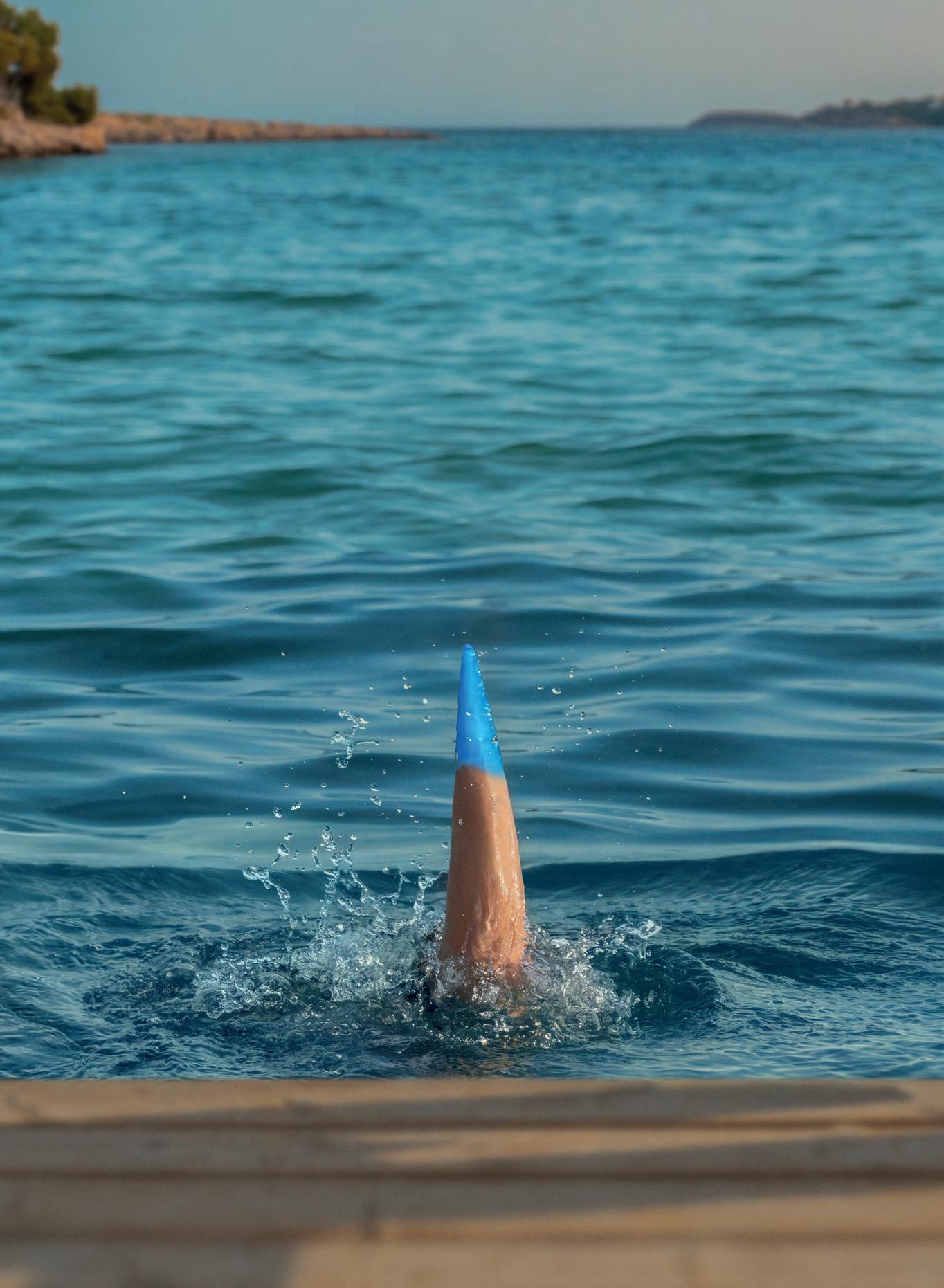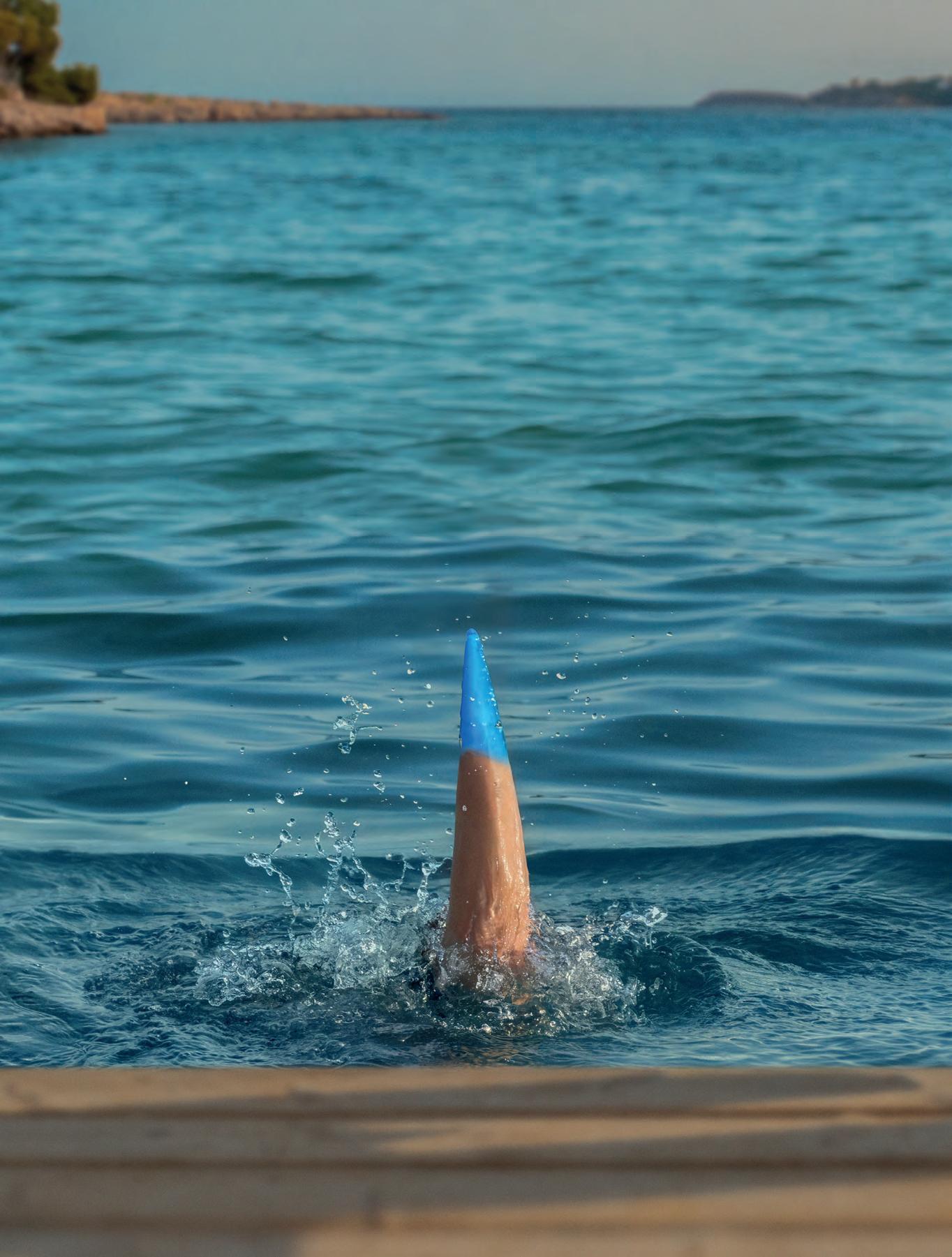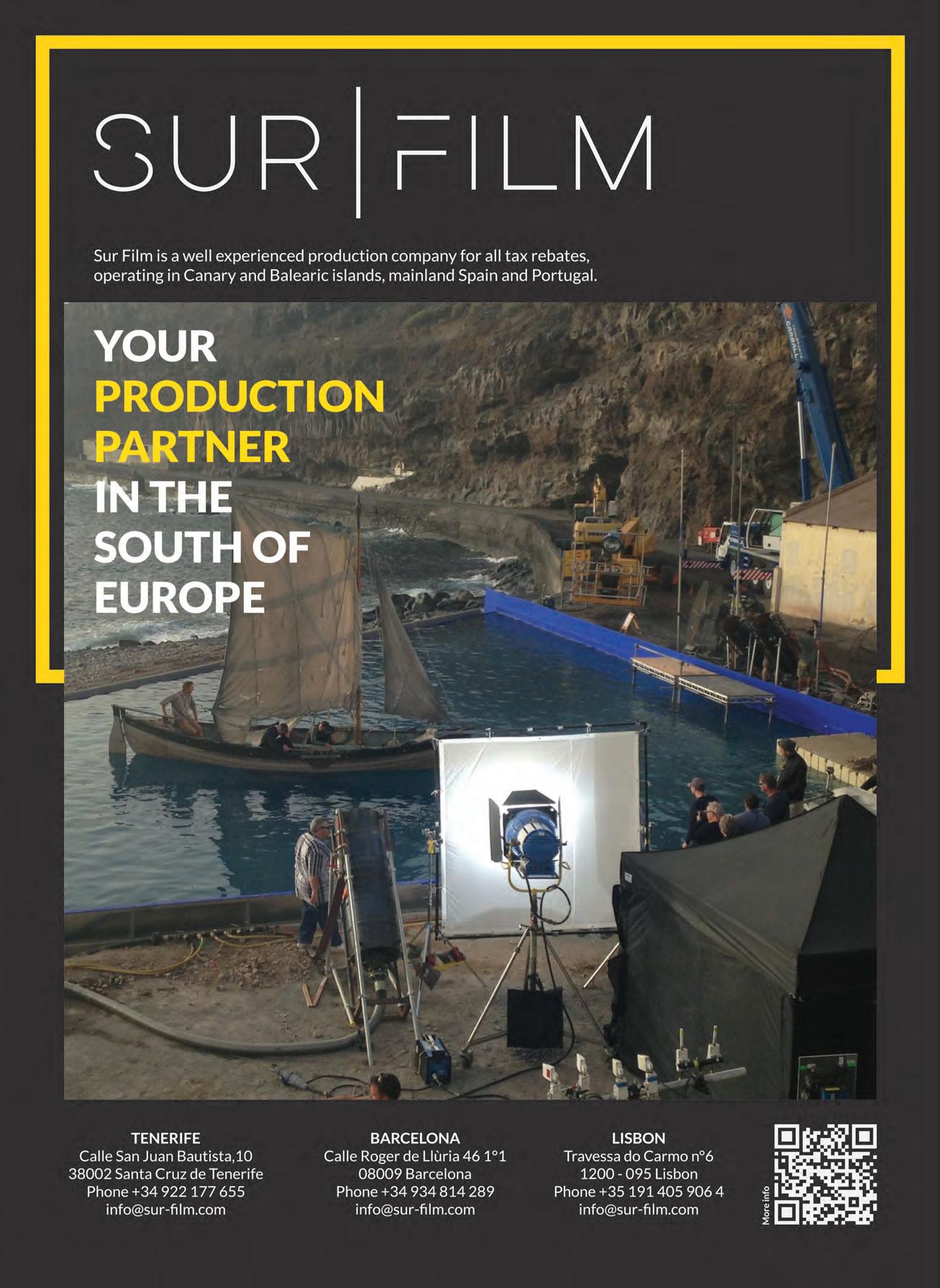






The team behind Rubik is happy to be able to meet our ambitious objectives. We wanted to launch a new trade magazine that offered an innovatice approach to film and TV journalism addressing the different points of view of the industry.
After five months, the feedback we are getting is amazing. This support encourages to keep working to do our best and offer comprehensive, quality information.
This is the second time we release an international edition in English. The experience we had with the first one, distributed in EFM – Berlinale, was extremely satisfying. Now we are on the way to Cannes for the most important film festival in the world and we’ll distribute this issue in the Marché du Film.
In our view, it´s essential that global film and TV industry is able to embrace trade magazines that are not from the United States and United Kingdom. In the same way that European Union works on Cultural diversity, we should reflect on the importance of having publications from different countries in Europe that are able to circulate in other territories and be read by
professionals from all over the world. This issue 5 of Rubik is mainly dedicated to the 77th edition of the Cannes Film Festival and its Marché du Film.
Our first pages display an overview of the films that will compete for the Palme d’Or and twelve works by important auteurs in other sections out of the Official Competition.
Rubik puts a special emphasis on Spanish, Portuguese and Latam Cinema . Thus, we cover here the films that festival’s committees have selected in this edition from these regions. By the way, we have a focus on Brazil, which is a trending country in film and TV after political change last year.
One of the honorary awards in Cannes 2024 is dedicated to Studio Ghibli , one of the leading companies in the History of Animation. In a world where animation is usually ignored at big festivals, it´s fair to ackknowledge the huge contribution to cinema made by Miyazaki, Takahata and company. We have a 5-page piece to pay our own home to the japanese studio.
Another tribute we are doing in this issue has to do with Spanish filmmaker Carlos Saura , who
passed away last year. Although he won lots of awards at class A festivals during his career,w e fell many of his masterpieces are now forgotten and especially international audiences don´t know how great his cinema is.
We publish an interview with Susan Newman , Eurimage’s executive director. This support fund of the Council of Europe has backed almos 2,500 feature film co-productions since 1989. Another relevant interview is the one we’ve conducted with Europa International’s executive director: Adeline Chauveau for a better understanding of the current situation of film sales companies.
At the last part of the magazine we publish an in-depth look at how the images are consumed in the age of attention. We live in a world where 3 and a half hour movies coexist with 3 and a half second Tiktok videos. You can also find in this issue previews for events like Annecy Film Festival or CineEurope Convention, as well a piece on Platino, the biggest Iberoamerican Awards.
Carlos Aguilar Sambricio and Miguel Varela

EDITED IN MADRID IN MAY 2024 BY MARATÓN AUDIOVISUAL S.L.
ISSN: ISSN 3020-5107
GENERAL CONTACT: HOLA@RUBIK-AUDIOVISUAL.COM
EDITORIAL CONTACT: REDACCION@RUBIK-AUDIOVISUAL.COM
ADVERTISING CONTACT: MARKETING@RUBIK-AUDIOVISUAL.COM FRONT COVER PHOTO: VOLVERÉIS (THE OTHER WAY AROUND) @ Memento International
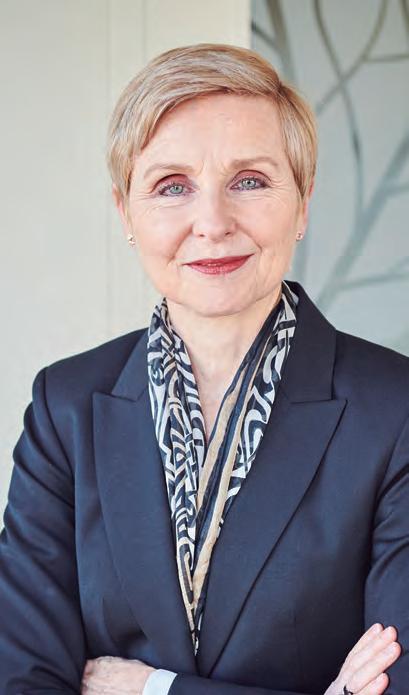 Furiosa: Mad Max Saga © Warner Bros.
Furiosa: Mad Max Saga © Warner Bros.

Spider-Man: Across the Spider-Verse © Sony Pictures

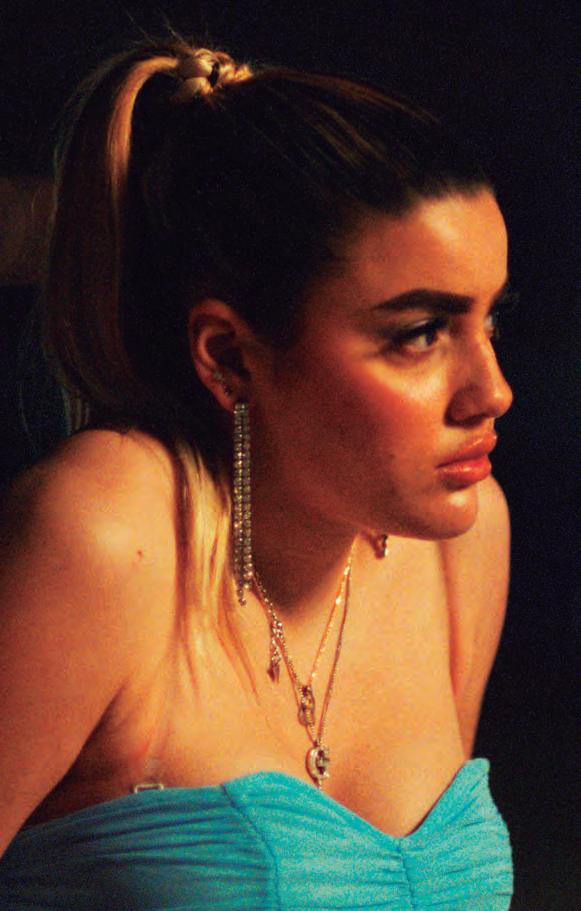

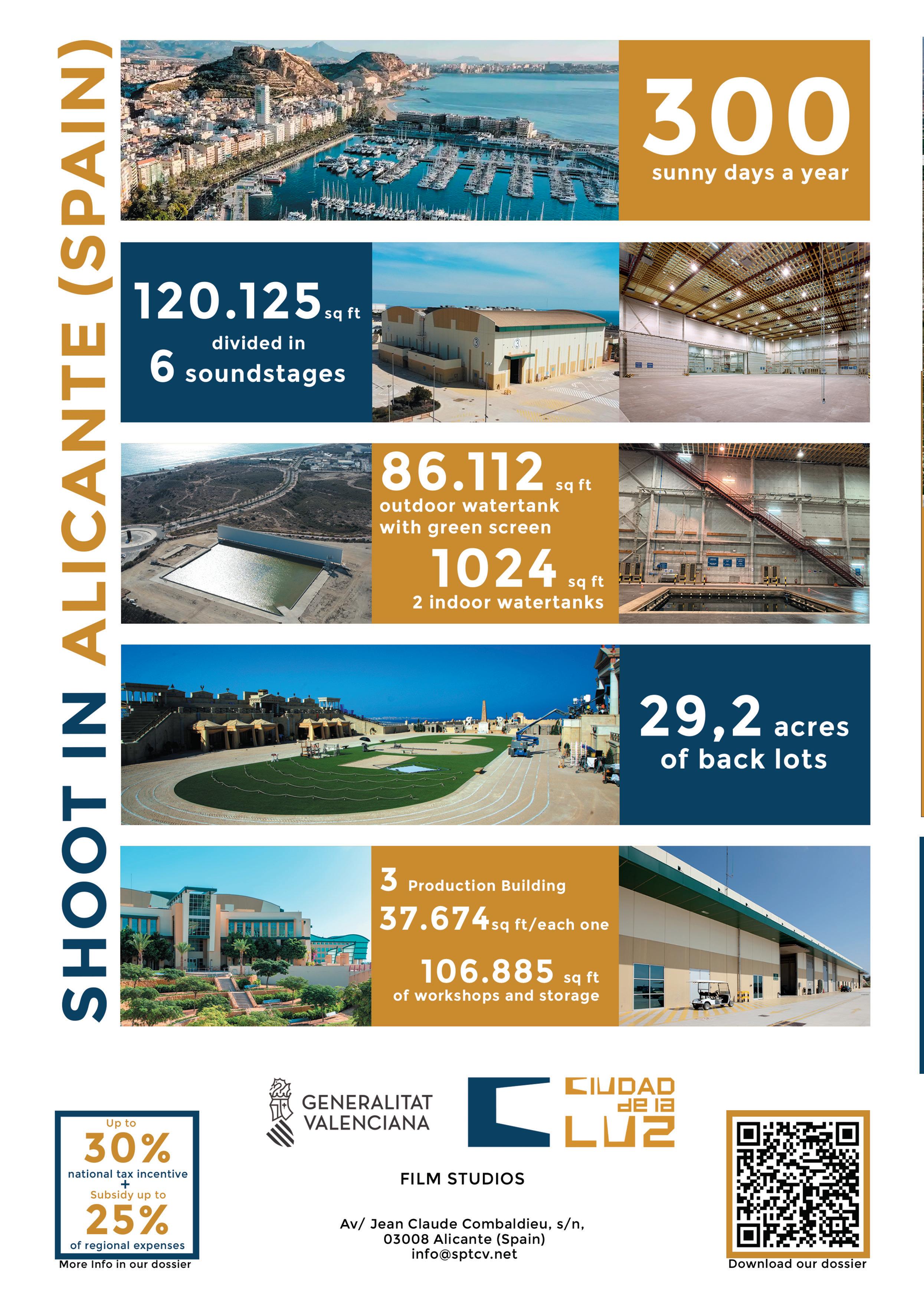
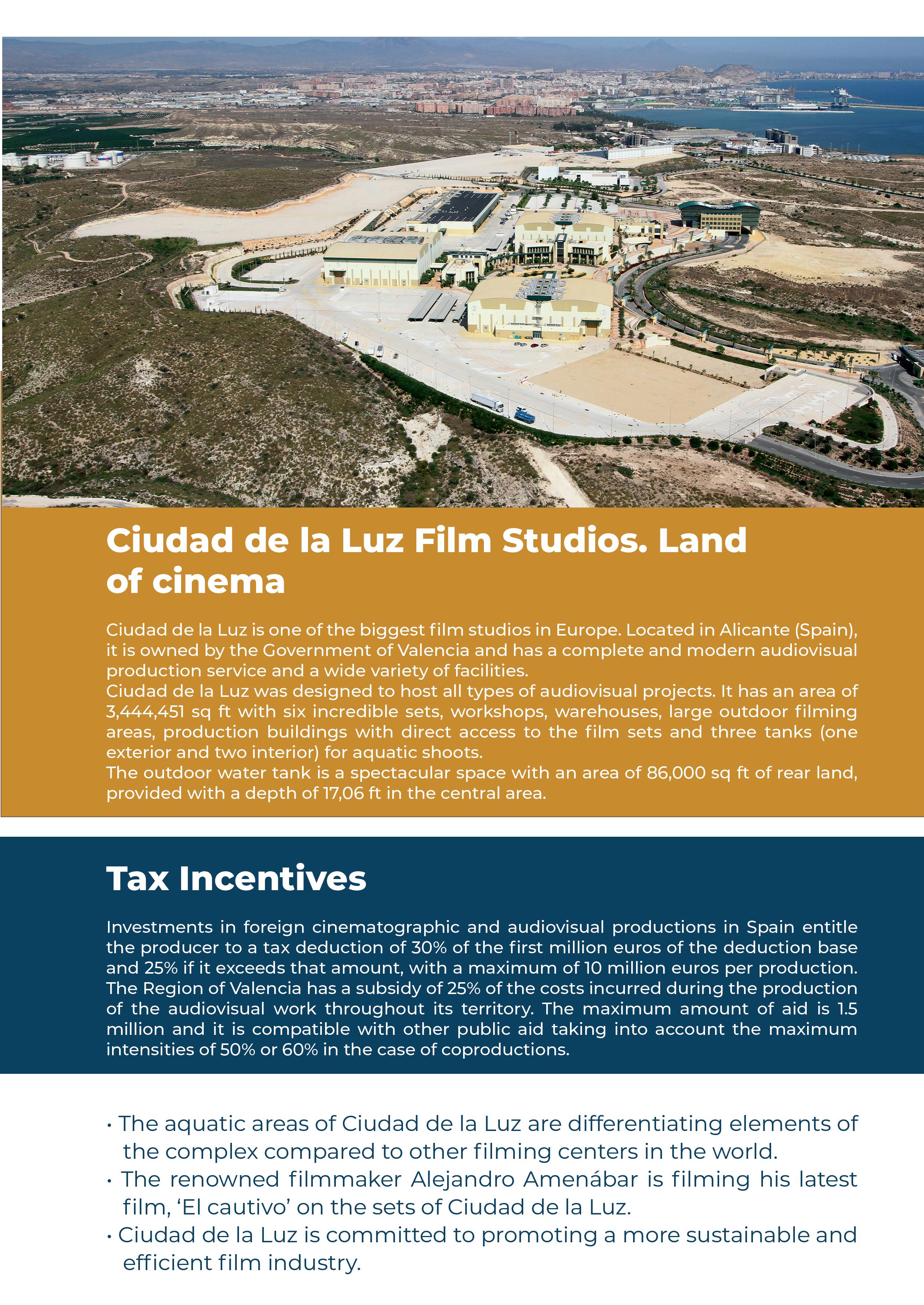

THE 77TH EDITION OF CANNES, THE GREATEST INTERNATIONAL FILM FESTIVAL, WILL BE HELD FROM MAY 14 TO 25. ALTHOUGH CINEMAS ARE STRUGGLING TO RECOVER PRE-PANDEMIC FIGURES, CULTURAL EVENTS LIKE CANNES ARE A MUCH NEEDED CELEBRATION OF CINEMA, A COLLECTIVE EXPERIENCE TO BE ENJOYED IN THE BIG SCREEN. IN THIS ARTICLE WE DIVE INTO THE 22 FILMS IN CONTENTION FOR THE PALM D’OR. THIS YEAR, GRETA GERWIG IS THE PRESIDENT OF THE MAIN JURY, WHICH INCLUDES EBRU CEYLAN, LILY GLADSTONE, EVA GREEN, NADINE LABAKI, JUAN ANTONIO BAYONA, PIERFRANCISCO FAVINO, HIROKAZU KOREEDA, AND OMAR SY. THE HONORARY GOLDEN PALMS IN 2024 GO TO GEORGE LUCAS, MERYL STREEP AND STUDIO GHIBLI.

THE APPRENTICE by Ali Abbasi. Iranian-Danish filmmaker Ali Abassi won rave reviews with his two previous films, Border and The Holy Spider, which took part in Cannes (Border was awarded as Best Film in Un Certain Regard). Now he submerges himself in an American tale about a young Donald Trump. The writer is Gabe Sherman, best known as the novelist behind ‘The Loudest Voice in the Room’, about Fox News founder Roger Ailes. London-based Rocket Science is in charge of global sales and cast is led by Sebastian Stan, Jeremy Strong and Maria Bakalova.
Storyline: The underbelly of the American empire. Set in 70s, the story charts a young Donald Trump’s ascent to power through a Faustian deal with the influential right-wing lawyer and political fixer Roy Cohn.

by Karim Aïnouz. The Match Factory handles international sales of Motel Destino , the only Latam film in contention for the Golden Palm. It’s second time in a row that Brazilian director Karim Aïnoux is in the Competition after last year’s Firebrand. This veteran filmmakers brings this time a tropical noir, where loyalties and desires intertwine, revealing that destiny has its own enigmatic design.
Storyline: Motel Destino is a roadside sex hotel under the burning blue skies of the coast of Northern Brazil, run by the boorish Elias and his frustrated, beautiful wife Dayana. When 21 year-old Heraldo finds himself at the motel, after messing up a hit and going on the run from both the police and the gang he let down, Dayana finds herself intrigued and lets him stay. As the two navigate a dance of power, desire and liberation, a dangerous plan for freedom emerges.

by Andrea Arnold. It´s been years since American Honey, last Andrea Arnold’s narrative feature film. She won Jury Prize at Cannes so her new movie, Bird, is long awaited. Cornerstone Films handles international sales of thi film produced by House Productions, and developed with BBC Film. Shot in UK, two of the most buzziest actors nowadays, Barry Keoghan and Franz Rogowski, are starring.
Storyline: Bailey, a 12-year-old girl, lives with her single dad Bug and brother Hunter in a squat in North Kent. Bug doesn’t have much time for his kids and Bailey who is approaching puberty seeks attention and adventure elsewhere.

EMILIA PÉREZ by Jacques Audiard. Audiard’s cinema is deeply connected to Cannes, where some of his movies have been awarded: Golden Palm for Dheepan (2015), Grand Jury Prize for A Prophet (2009) and Best Screenplay for A Self-Made Hero (1996). Produced by Why Not Productions, Saint Laurent Productions, Pagge 114, Pathé and France 2 Cinema, this musical is the only Spanish-speaking film on Competition. Spanish Trans Actress Karla Sofía Gascón leads a cast that also features Zoe Saldaña, Selena Gómez, Edgar Ramírez and Adriana Paz.
Storyline: Mexico, today. Lawyer Rita receives an unexpected offer. She has to help a feared cartel boss retire from his business and disappear forever by becoming the woman he’s always dreamed of.

ANORA by Sean Baker. Sean Baker is one of the leading US indie filmmakers, after succesful films like Red Rocket, The Florida Project and Tangerine. Film at Brooklyn on 35mm film, it´s his biggest film to date, and it brings more comedy than the rest of his features. FilmNation is handling world sales while ensemble cast includes Mikey Madison, Mark Eydelshteyn, Yura Borisov, Karen Karagulian, and Vache Tovmasyan.
Storyline: While the storyline remains shrouded in secrecy, the film promises to be an exhilarating romantic adventure, featuring a vibrant, neon-lit club scene, and telling the story of a sex worker.

Coppola. There’s no doubt this is the most awaited film in Cannes 2024. Megalopolis has been a dream project for F.F. Coppola during 40 years. When everybody thought it would never be made, the filmmaker has done a crazy brave move: he has self-financed this $120m feature by selling part of his vineyard.
Goodfellas is handling sales for this ambitious film, whose cast includes Adam Driver Giancarlo Esposito, Nathalie Emmanuel, Aubrey Plaza, Shia LaBeouf, Jon Voight, Laurence Fishburne, Talia Shire, and Jason Schwartzman. Coppola is a two-time Palme d’Or winner for The Conversation (1974) and Apocalypse Now (1979, tied).
Storyline: A disaster has wrecked New York City and wiped off its urban infrastructure. Amid chaos, an architect wants to rebuild the city as a utopia.
Beloved by Cannes, David Cronenberg is back at the Croisette with a new horror film that’s supposed to be one of his most personal movies. This project was conceived as a Netflix series but the streamer canceled the show after the Canadian filmmaker had written two episodes. Sales are handled by SBS International, the sales arm of Saïd Ben Saïd, who is producing with Prospero Pictures and Saint Laurent Productions. It has a cast featuring Diane Kruger, Vincent Cassel and Guy Pearce.
Storyline: It follows the story of a widower and businessman named Karsh who builds a new device that can connect people with the dead inside a burial shroud.

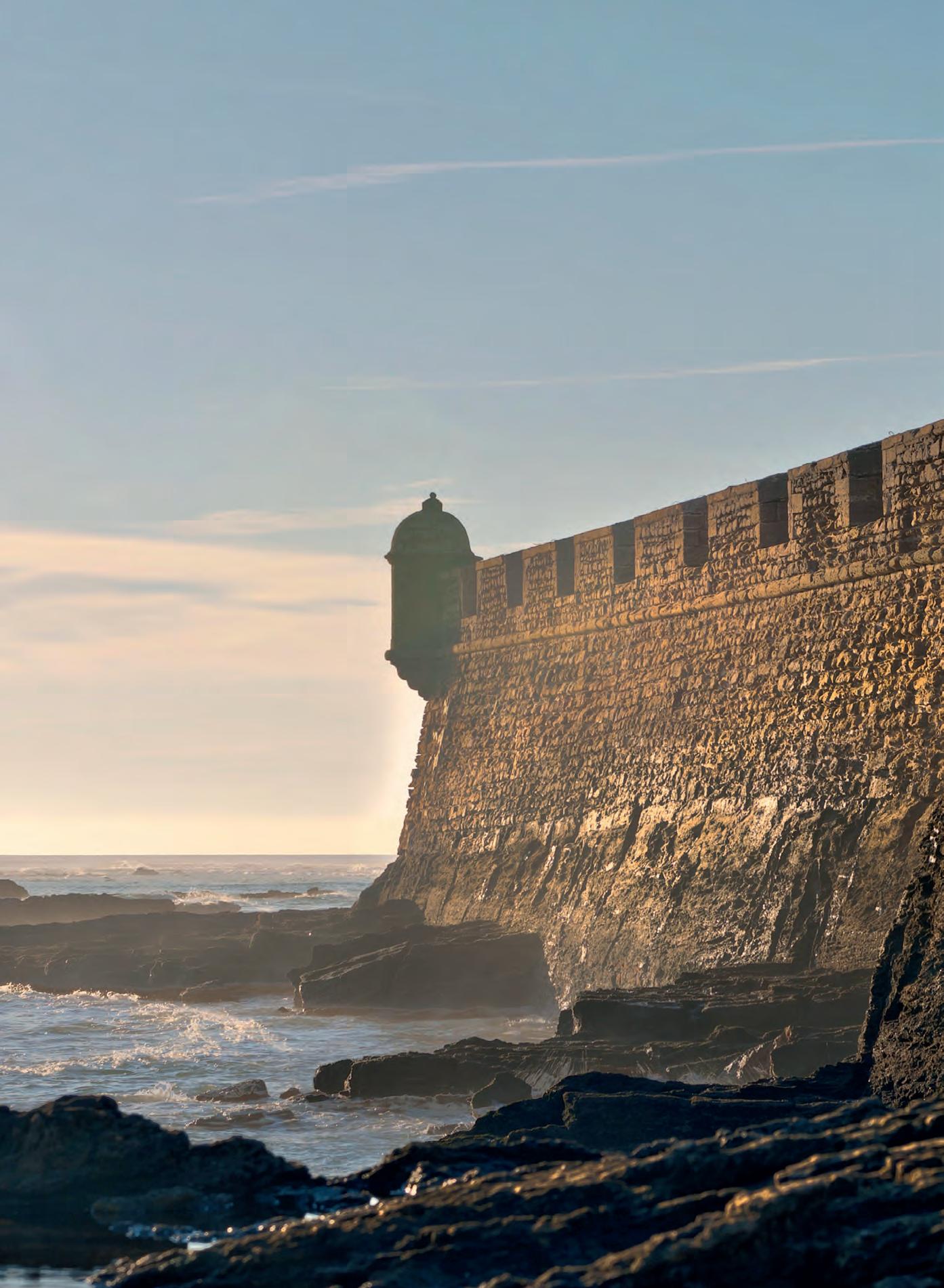
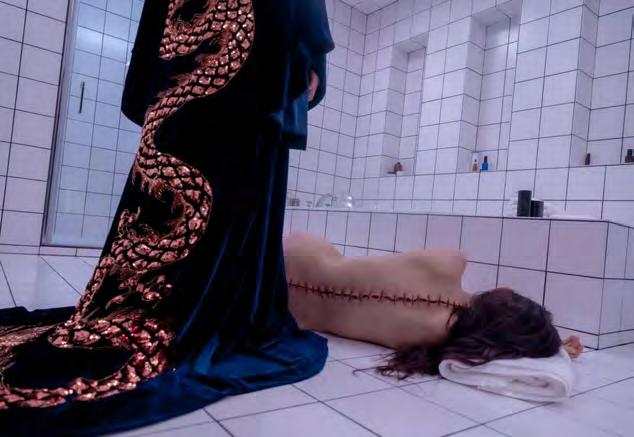
There’s just a few female filmmakers in competition. One of the pleasant surprises is Coralie Fargeat, French filmmaker that grabbed genre audience’s attention with Revenge, acclaimed rape-revenge thriller that won Best Directing in Sitges Film Festival. Now, her second feature film is backed by Universal Pictures and Working Title Films and it has Margaret Qualley, Dennis Quaid, Demi Moore, Hugo Diego Garcia and Joseph Balderrama as main performers.
Storyline: Have you ever dreamt of a better version of yourself? You, only better in every way. You should try this new product, it’s called The Substance. With The Substance, you can generate another you: younger, more beautiful, more perfect. You just have to share time – one week for one, one week for the other. A perfect balance of seven days each… Easy right? If you respect the balance…what could possibly go wrong?

by Christophe Honoré. This is one of the most expected French movies of the year. Christophe Honoré ( Sorry Angel, La belle personne ) helms this comedy that circles around the myth of Macello Mastroianni. Starring Chiara Mastroianni, Catherine Deneuve and Fabrice Luchini, Mk2 Films sells this movie that delves into the concept of family lineage, the indelible memory of an image, and the impact of the gaze of others on the construction of one’s own self-image.
Storyline: This is the story of a woman named Chiara. She is an actress, the daughter of Marcello Mastroianni and Catherine Deneuve, who one summer when her own life is in turmoil, tells herself that should would prefer to live her father’s life. She dresses like him, speaks like him, breathes like him, with such force that those around her begin to believe it and start to call her ‘Marcello’.
Gomes had an amazing track record with Our Beloved Month of August, Tabú and the Arabian Nights trilogy. But the latter is almost 10 years old so it’s splendid news that we have a new film by the Portuguese director. Bold and ambitious, it features narrative sequences shot in studio intercut with footage of contemporary Asia. The film is being sold by The Match Factory.
Storyline: Rangoon, Burma, 1917. Edward, a civil servant for the British Empire, runs away from his fiancée Molly the day she arrives to get married. During his travels, however, panic gives way to melancholy. Contemplating the emptiness of his existence, the cowardly Edward wonders what has become of Molly… Determined to get married and amused by Edward’s move, Molly follows his trail on this Asian grand tour.
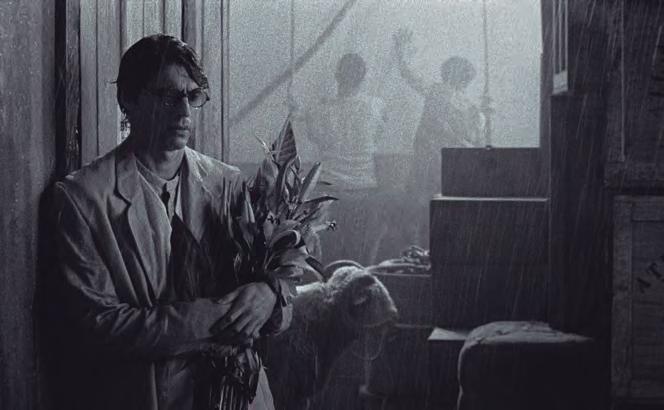

It´s been six years since Jia Zhangke competed at Cannes (with Ash is the Purest White). We are talking about most important Chinese filmmaker in this century, who has been embraced by Cannes since Unknown Pleasures in 2002. Zhao Tao is the star of this romantic drama set in China and spans 25 years of a country experiencing profound transformation. Buyers have to contact Mk2 to acquire its rights.
Storyline: An enduring but fragile love story shared by Qiao Qiao and Guao Bin, from the early 2000s to the present day. One day, a restless Guao Bin leaves without any notice to try his luck in another province. Qiao Qiao decides to go looking for him.
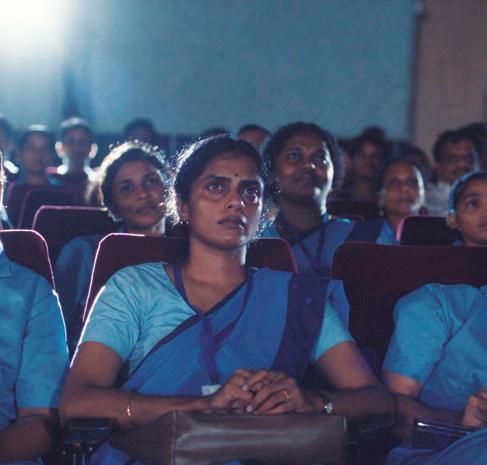
by Payal Kapadia. It´s rare to see an Indian movie in Cannes’s Competition. Actually, last time was 30 years ago (Shaji N. Karun’s Swaham in 1994). But Kapadia is not a newcomer in Cannes. She won the Golden Eye Award for Best Documentary playing in the Quinzaine. Her new film, whose sales are managed by Luxbox, tells the story of two women on a holiday where they find a vent for their desires.
Storyline: In Mumbai, Nurse Prabha’s routine is troubled when she receives an unexpected gift from her estranged husband. Her younger roommate, Anu, tries in vain to find a spot in the city to be intimate with her boyfriend. A trip to a beach town allows them to find a space for their desires to manifest.
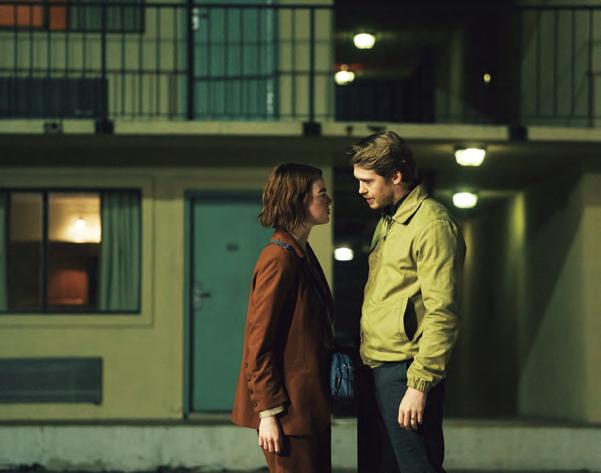
by Yorgos Lanthimos. After massive acclaimed with Poor Things, Yorgos Lanthimos teams up again with Searchlight Pictures. Greek filmmaker was a Cannes discovery when the festival selected Dogtooth in 2009 for Un Certain Regard. Last two movies, The Favourite and Poor Things, had premiered at Venice, though. Script was written by Efthimis Filippou and Lanthimos itself. Emma Stone and Willem Dafoe are once again in the cast, along with Jesse Plemons, Margaret Qualley, Hong Chau, Joe Alwyn, Mamoudou Athie and Hunter Schafer.
Storyline: It´s a triptych fable following a man without choice who tries to take control of his own life; a policeman who is alarmed that his wife who was missing-atsea has returned and seems a different person; and a woman determined to find a specific someone with a special ability, who is destined to become a prodigious spiritual leader.

HEARTS by Gilles Lellouche. This is an epic love story starring Adèle Exarchopoulos (Blue is the
) and François Civil (The Three Muketeers), that sales company StudioCanal describes as a modern-day ‘Romeo and Juliet’ story tackling love, revenge and redemption. Directed by Gilles Lellouche (Sink or Swim), the responsible for Happening, Audrey Diwan, contributes to the script.
Storyline: Raised in a troublesome neighbourhood, local rebellious teenager Clotaire falls for his schoolmate Jackie. As powerful first love blossoms between the two, rampant gang violence entices him into a much darker path and ultimately destroys all they have built when he is charged with a crime he didn’t commit. After many years apart, now leading profoundly different lives, the star-crossed lovers discover that every path they’ve taken leads them back together.
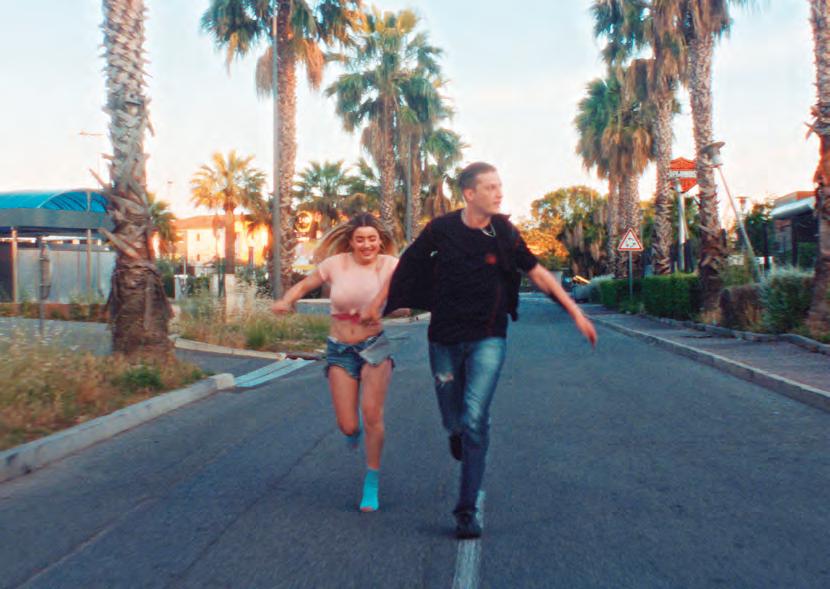
LIMONOV - THE BALLAD by Kirill Serebrennikov Russian filmmaker Serebrennikov is becoming a usual name at Cannes competition. This is his fourth appearance after Leto, Petrov’s Flu and Tchaikovsky’s Wife. His new movie is based on the novel ‘Limonov’ by Emmanuel Carrère, and the adaptation is co-written by famed Pawel Pawlikowski, who is also exec producer. Ben Whishaw stars in this film whose sales are being handled by Pathé in collaboration with Vision Distribution.
Storyline: A revolutionary militant, a thug, an underground writer, a butler to a millionaire in Manhattan. But also a switchblade-waving poet, a lover of beautiful women, a warmonger, a political agitator, and a novelist who wrote of his greatness. Eduard Limonov’s life story is a journey through Russia, America, and Europe during the second half of the 20th century.
by Agathe Riedinger. The only debut feature film in Competition is this film made by French filmmaker Agathe Riedinger, who directed short films such as Eve and J’attends Jupiter. Her style sits on excess and irony, sometimes deliberately vulgar or surreal, to question a certain vision of the world. Pyramide is handling world sales of this Silex Films production.
Storyline: Liane, a reckless 19 years old woman, lives with her mother and her little sister under the dusty sun of Fréjus. Obsessed by beauty and the need to become someone, she sees in reality TV the possibility of being loved. Destiny finally seems to smile on her when she goes through a casting call for ‘Miracle Island’.


by Paolo Sorrentino. Sorrentino’s tenth feature film is a return to Naples. After he directed the autobiographical The Hand of God, the Italian filmmaker is paying an homage again to his native city. This year marks the 20th anniversary of his first Cannes appearance: The Consequences of Love. Starring Gary Oldman, Celeste Dalla Porta, Silvia Degrandi, Isabella Ferrari, Lorenzo Gleijeses, Peppe Lanzetta and Silvio Orlando, sales are handled by UTA and Fremantle.
Storyline: The film explores the life of Parthenope from her birth in 1950 to today. Her long life embodies the full repertoire of human existence: youth’s lightheartedness and its demise, classical beauty and its inexorable permutations, pointless and impossible loves, stale flirtations and dizzying passion, nighttime kisses on Capri, flashes of joy and persistent suffering, real and invented fathers, endings, and new beginnings.
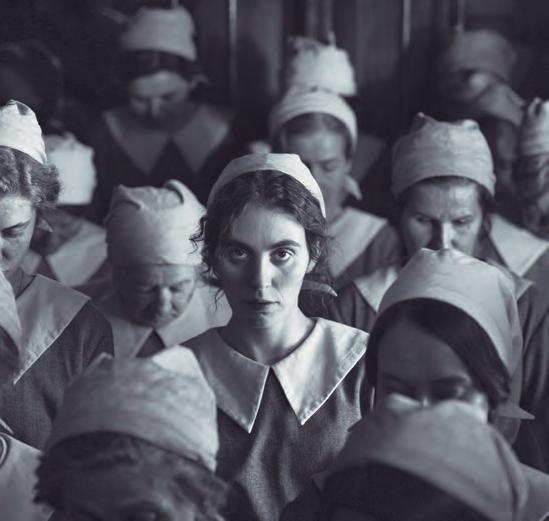
by Magnus van
Horn . Third feature film by Swedish filmmaker. He’s been well received from Cannes from the beginning of his career since his debut film, The Here After (2015) had its world premiere in the Quinzaine section. The film is inspired by the true story of Dagmar Overbye who killed a large number of babies born out of wedlock in Copenhagen between 1913 and 1920. Sales for this black-and-white movie are handled by The Match Factory
Storyline: Karoline, a young factory worker, is struggling to survive in post WW1 Copenhagen. When she finds herself unemployed, abandoned and pregnant, she meets Dagmar, a charismatic woman running an underground adoption agency, helping mothers to find foster homes for their unwanted children. Karoline takes on the role of a wet-nurse where she stumbles upon a shocking truth.

Michel Hazanavicius. Animation is rarely at Cannes main section. Last time an animated feature film could fight for the Golden Palm was in 2008: Ari Folman’s Waltz with Bashir. This is an adaptation of the eponymous book by children’s books author Jean-Claude Grumberg, who is co-writing the film with the director, Michel Hazanavicius (The Artist). Alexandre Desplat is the music composer and StudioCanal is in charge of worldwide sales.
Storyline: Once upon a time there was a poor lumberjack and his wife who lived in a deep Polish forest. The poor woman moaned that she had no children. Day and night, trains passed through the woods. One day, as the poor woman was watching a train that she thought was a cargo train, a package was thrown out and fell into the snow…

THE SEED OF THE SACRED FIG by Mohammad Rasoulof. Mohammad Rasoulof is currently one the leading Iraning filmmakers; he recently won the Golden Bear in Berlin with There Is No Evil. He’s had three films Cannes before but he´s never been in Competition. But it´s hard to talk about cinema when it comes to his case. It´s unclear if he’ll be able to attend. He was invited last year to serve on the jury but Iran government didn´t let him travel. According to what it´s been published, Iranian authorities have summoned and interrogated producers and cast of the film and subsequently prohibited from leaving the country, besides pressuring to convince the director to withdraw the film from the festival. Films Boutique has board world sales.
Storyline: The story centers on Iman, an investigating judge in the Revolutionary Court in Tehran, who grapples with mistrust and paranoia as nationwide political protests intensify and his gun mysteriously disappears.

Paul Schrader is still releasing top-notch films like First Reformed, The Card Counter or Master Gardener. Now he is adapting the novel ‘Foregone’ by Russell Banks, the man who wrote Affliction, arguably Schrader’s best film. With this new production Schrader reunites with Richard Gere, who starred in praised American Gigolo. Uma Thurman, Jacob Elordi and Michael Imperioli are also in the cast. Arclight Films are sales reps.
Storyline: Leftist documentary filmmaker Leonard Fife was one of sixty thousand draft evaders and deserters who fled to Canada to avoid serving in Vietnam. Now in his late seventies, Fife is dying of cancer in Montreal and has agreed to a final interview in which he is determined to bare all his secrets at last, to demythologize his mythologized life.
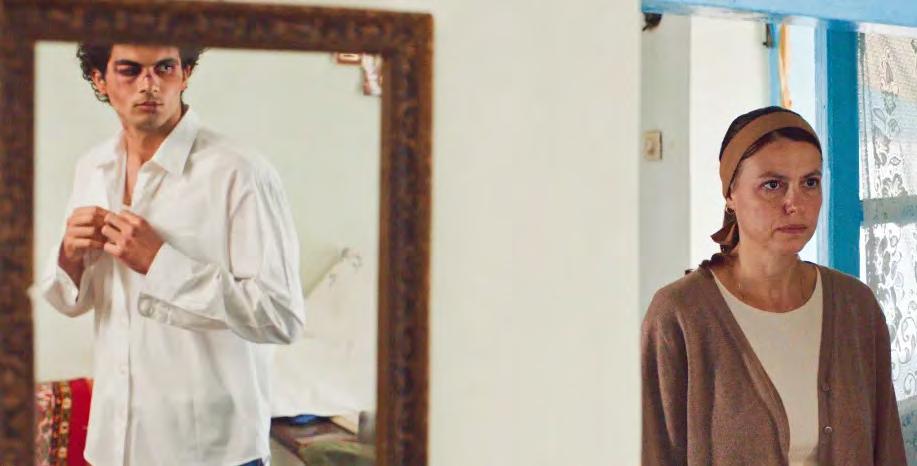
by Emanuel Pârvu. The buzz on Romanian Cinema is not so loud as in the past, but Cannes has selected the third feature film by emerging filmmaker Emanuel Pârvu. His second film, Mikado, premiered in San Sebastian’s New Directors sidebar in 2021. Goodfellas sells world sales of this thriller produced by FAMart Association.
Storyline: A 17-year-old young man is spending the summer in his home village in the Danube Delta wetlands region in Romania. One night he is brutally attacked on the street and the next day his world is turned upside-down. His parents no longer look at him as they did, and the seeming tranquility of the village starts to crack.

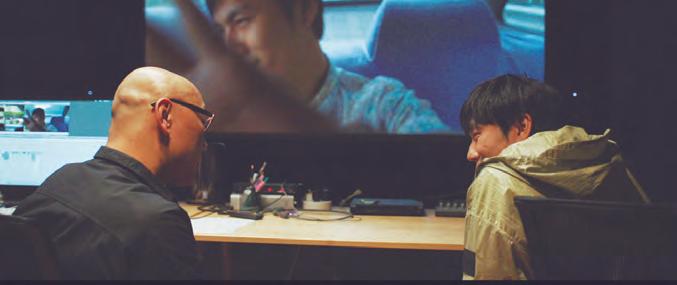


‘Everybody Loves Touda’
Nabil Ayouch
Sales: mk2 Films
‘Furiosa: Mad Max Saga’
George Miller
Sales: Warner Bros. Pictures ‘Horizon, An American Saga’
Kevin Costner
Sales: K5 International



Second Act’
Quentin Dupieux
Sales: Kinology


‘Filmlovers!’
Sales: Les Films du Losange
‘The
Sales: Atoms & Void
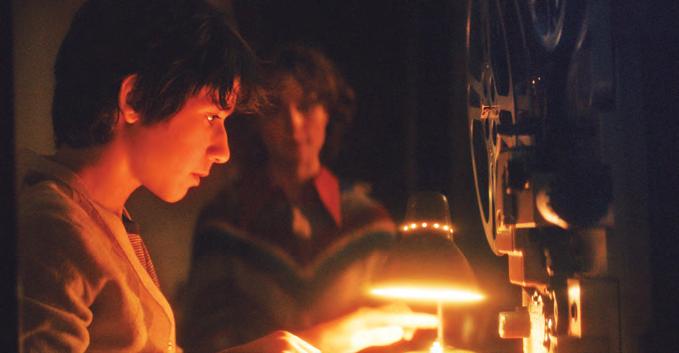

‘When the Light Breaks ’ Rúnar Rúnarsson
Sales: The Party Film Sales
mk2 Films
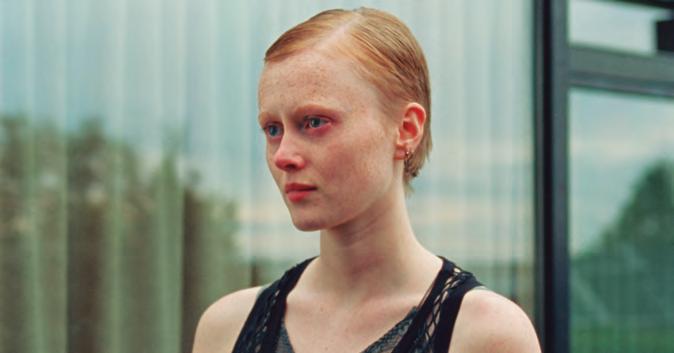

SALES COMPANIES ARE AT THE CORE OF THE MARCHÉ DU FILM IN CANNES. THE BIGGEST FILM MARKET IN EUROPE IS ALWAYS BUSTLING WITH ACTIVITY AND NEGOTIATIONS. FOR A BETTER UNDERSTANDING OF THE CURRENT SITUATION OF FILM SALES, WE HAVE INTERVIEWED EUROPA INTERNATIONAL’S EXECUTIVE DIRECTOR: ADELINE CHAUVEAU.


Europa International (EI) was created in 2011 by international film sales agents who wanted to have a European body to represent them, to help them defending their general interest and to create links within the profession and the rest of the film industry.
Currently, the organization board of administration is the following: Alice Lesort, Head of International Sales at Les Films du Losange and Katarzyna Siniarska, Head of Sales at New Europe Film Sales are CoPresidents of Europa International. Jenny Walendy (The Match Factory) is treasurer of Europa International while Florencia Gil (Urban Sales), Gaetano Maiorino (True Colours), Francesca Manno (Summerside Media), Valeska Neu (Films Boutique) and Leo Teste (Film Constellation) are members of the board.
Rubik: Sales companies are essential for cinema ecosystem. Don’t you think they are not as regarded as they should?
Adeline Chauveau: The job of international film sales agents is rather ‘new’ (we are usually dating it back from the 1980s)
“EUROPA

compared to the rest of the cinema ecosystem. Therefore, it is indeed still yet quite unknown from the general public. However, we hope, with Europa International, to raise awareness on the expertise of sales agents and their essential position within the film ecosystem.
We are also working very closely with our colleagues from the other parts of the industry as we are all so much linked to one another (scriptwriters, directors, staffs, crew, producers, sales, distributors, exhibitors and broadcasters/platforms).
Rubik: I guess forging the association has been key to have an interlocutor with european institutions and policy makers. What topics has Europa International discussed with them and what are your primary claims?
A.C.: Indeed, my predecessor, Daphné Kapfer, who was the first Managing Director of EI (from 2011 to 2021) along, of course, the boards of administration of the association, did an incredible job at positioning EI as a central actor in the conversation between European film sales agents and the European public bodies.
“European film sales agents can get fundings from the MEDIA strand under two different calls: European Film Sales and Films on the Move. Those supports are paramount for the visibility of European films in Europe”.
Since the very beginning, EI has been in close contact with the European public institutions to explain the importance and the expertise of European film sales agents in the circulation of European works both in and outside of Europe.
European film sales agents have the opportunity to get fundings to improve and increase the circulation of European films
from the Creative Europe-Media strand by the European Commission under two different calls: European Film Sales and Films on the Move. Those supports are paramount for the visibility of European films in Europe and they have been created and have evolved thanks to our close conversation with the European Commission and other professional organisations such as Europa Distribution and FIAD.
Recently, territorial exclusivity has been under threat during the European Parliament plenary votes which took place on 13 December 2023, regarding the IMCO report proposing the revision of the 2018 regulation on geo-blocking in the digital single market (2023/2019(INI)). EI, together with more than 700 organisations from the audiovisual sector, signed a call to preserve Europe’s cultural and linguistic diversity.
As “a ban on the use of geo-blocking technology to support territorial exclusivity for film and audiovisual content and services would severely jeopardize the creative and economic sustainability of the film and audiovisual sector in Europe. This would result in a drop in the number and range of films

and audiovisual content produced, with a smaller variety of languages. Distribution and circulation would be drastically reduced across the EU. This would have a direct and negative impact on consumer welfare: significant
“We cannot stress enough that territorial exclusivity and geoblocking are essential for the European film industry to finance the creation of the films and to safeguard distributors, exhibitors, and festivals”
reduction of choice in content, distribution, and access options as well as a surge in prices”. EI welcomed the European Parliament’s decision to keep the audiovisual sector outside the scope of the Geo-blocking Regulation.
Once again, we cannot stress enough that territorial exclusivity and geo-blocking are essential for the European film industry to finance the creation of the films and to safeguard the interests of local actors such as distributors, exhibitors, and festivals. Their efforts in creating targeted marketing and promotional campaigns are crucial to ensure that films reach a visibility threshold and are discovered by increasingly fragmented and diversified audiences.
Europa International was also very happy about the positive feedback given by the European Parliament on the Creative Europe Programme in the ‘Report on the implementation of the Creative Europe Programme 2021-2027’. It is always important to see that the hard work of our members and
professionals of the cultural sector is being acknowledged and strongly supported by public bodies.
Rubik: When looking at sales companies in Europe, there are a lot of them in countries like France, UK or Germany, for instance. Do you think some other countries should support the existence of strong local sales companies?
A.C.: Our network groups 52 companies from 12 different European countries; these numbers shows that there are sales companies in a lot of different countries in Europe and we are very happy about it!
However, you are right when saying that most countries are unfortunately not acknowledging the important role of international film sales agents as, except for France, Italy and Spain, sales agents are not supported by national schemes. Other countries like the UK or Germany are supporting the circulation of national films in and outside of Europe but most are not supporting sales agents and the circulation of their films, which is a pity as we think that this is paramount for a better visibility of European films in Europe and in the world.
Rubik: As we said before, sales companies are essential. But some producers may think it´s enough selling the movie to a big streamer like Netflix instead of going territory by territory with a sales company in order to have a theatrical release. Is it key to highlight the importance of this distribution?
A.C.: One of the conditions to become an EI member is to be licensing the films for all
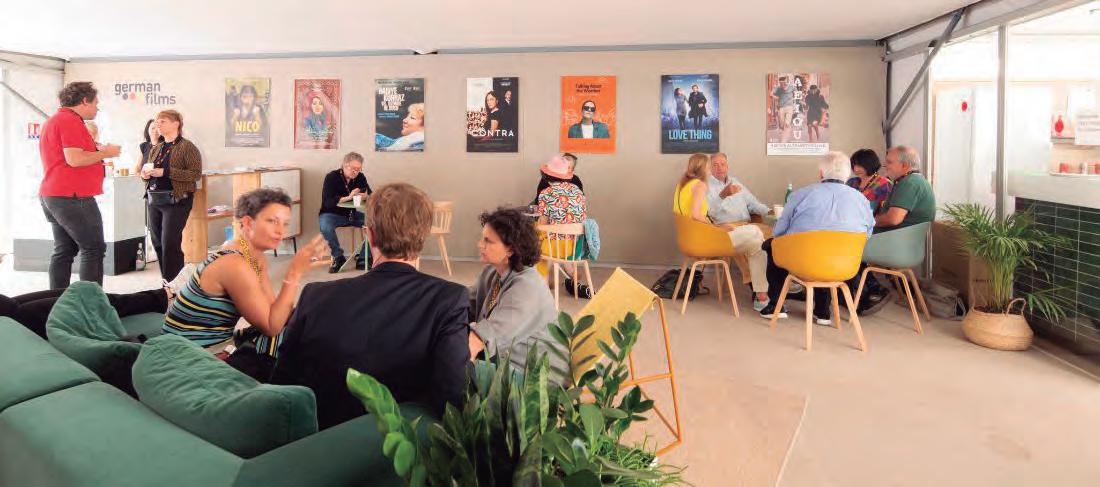
“Most countries are unfortunately not acknowledging the important role of international film sales and they are not supporting sales agents and the circulation of their films”
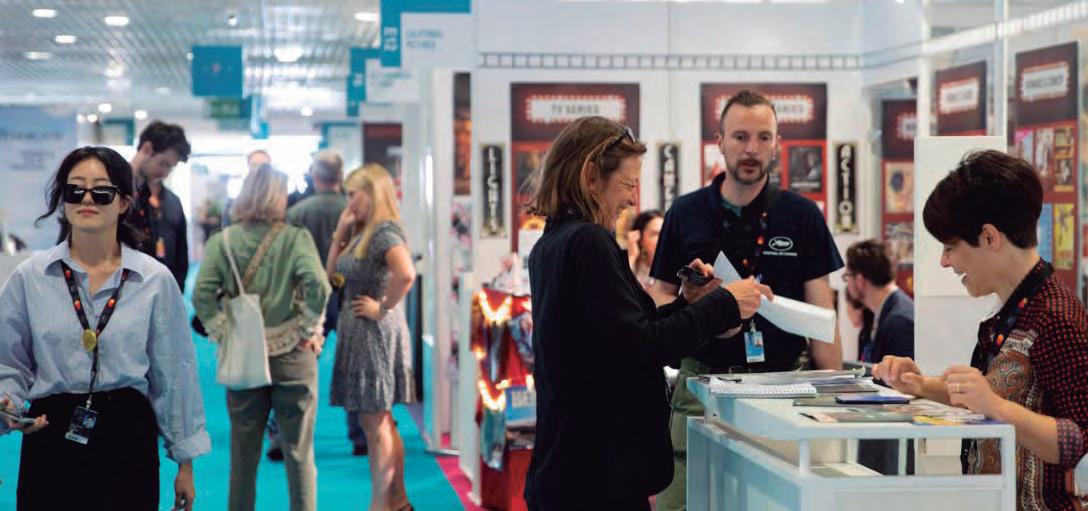
releases (theatrical, VoD – transactional and subscription, TV), therefore EI and its member companies strongly believe in theatrical releases!
Here, please allow me to quote the ‘Annual Report 2023’ by UNIC (International Union of Cinemas) on p. 33: “For European content, VOD availability is linked to admissions during their theatrical run. A German study ‘Circulation Patterns, Abundance and Scarcity: Film Availability in the Online Era’ by Roderik Smits, shows how the best-performing films in cinemas tend to have wider online availability and are more likely to circulate on a larger number of VOD platforms. The number of theatrical release markets and VOD country availability for a given title are correlated. In the same way, the majority of the films not available on VOD had only one theatrical release market, usually their own”.
Rubik: Related to this would be the theatrical experience. This year’s box office is struggling and we were still not close to prepandemic numbers. Do you think the market for theatrical will recover?
A.C.: We are hoping for the market to recover and we would like here to highlight the great work made by distributors, exhibitors, public bodies and promotional institutes in trying to bring audiences back to the big screens.
We are quite hopeful when we see that some countries are already almost back to their pre-pandemic admission levels or when we see figures such as the box office admission scored by Anatomy of a Fall by Justine Triet (sold by MK2, one of EI member companies) in China this year.
Rubik: However, I think european films don´t travel enough among other european countries. There are some initiatives powered by EU (like Europa Cinemas) but don´t you think something more should be done to strenghten the exhibition of european cinema in Europe?
A.C.: We fully agree, the MEDIA strand of the Creative Europe Programme, under which are supported initiatives in the audiovisual and cinema sectors, is of crucial importance for audiovisual and cinema actors.
However, it is also a programme with not much fundings compared to other support programmes from the European Commission, whereas a lot of audiovisual and cinema actors are applying to get support. We are therefore calling for a budget increase of the MEDIA programme so that more may be done to strengthen and increase the circulation and exhibition of European films in Europe.
Rubik: Now Marché du Film in Cannes is about to start. This is the biggest film market
in Europe. In terms of a sales company, what´s special about it?
A.C.: Cannes is the most important film market of the year of EI members. This is when they can present their films and meet a maximum of their clients.
As for the organization, this is also when we are organizing one of our General Assemblies and that all sales agents can meet their colleagues and get a sense of the market.
Rubik: What are the main challenges and needs for sales companies in the next years?
A.C.: The market is changing and international film sales agents are always trying to move forward, think ahead and evolve with it. As an association, we have identified the following challenges but we are always staying aware and try to answer to the members’ need if something is coming up: maintaining the territorial exclusivity and geo-blocking exception for cultural works in Europe; making sure that European cinema still circulates in Europe and in the world and has all the tools it needs to fully and effectively reach its audiences; and understanding and taking full advantages of the potentialities of generative artificial intelligence for the sales agents while identifying its challenges (IP protection, data protection, etc.).
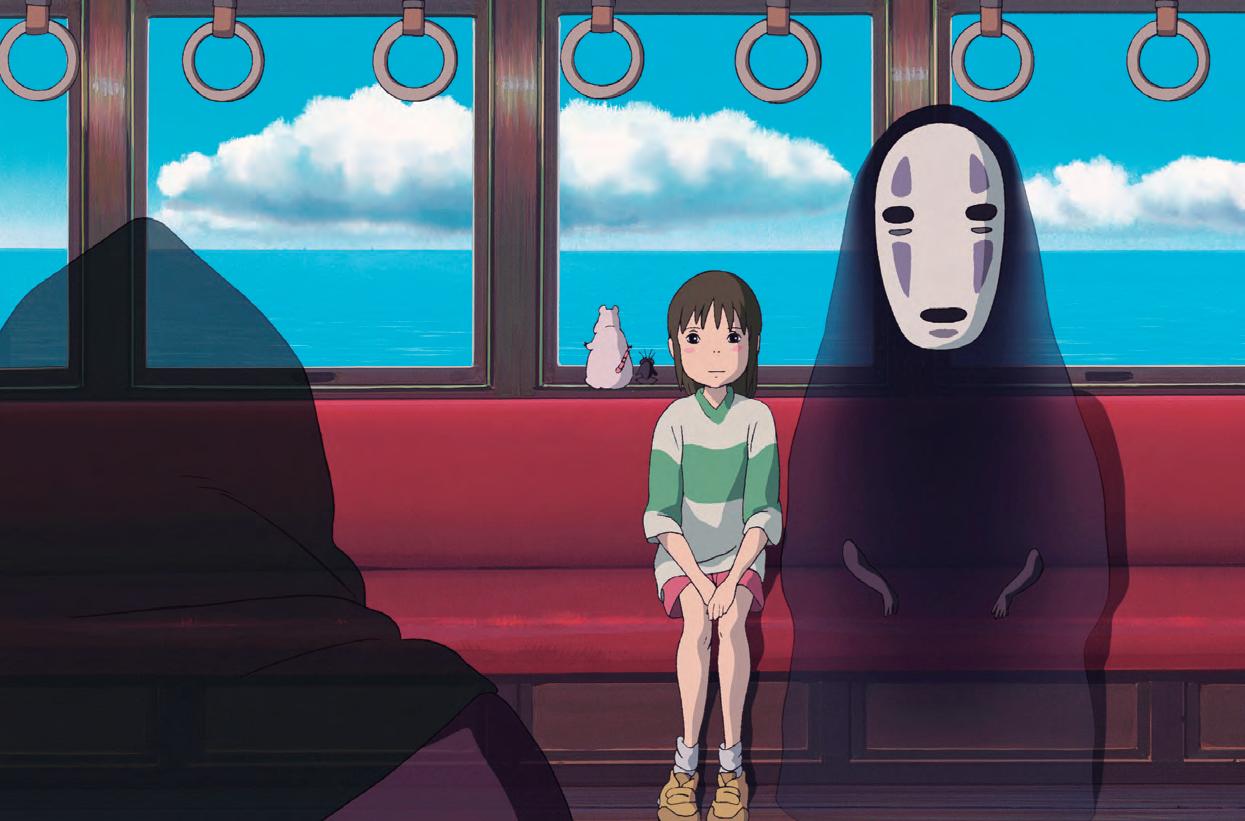
THE CANNES FESTIVAL AWARDS, FOR THE FIRST TIME IN ITS HISTORY, THE HONORARY PALME D’OR NOT TO A PERSON BUT TO A CREATIVE COLLECTIVE, STUDIO GHIBLI, FOR ITS VALUABLE AND UNQUESTIONABLE CONTRIBUTION TO CINEMA. THE HOUSE OF TOTORO, NICKY, POMPOKO, PORCO ROSSO, PONYO, THE YAMADAS AND MANY OTHER MEMORABLE CHARACTERS CREATED BY STUDIO GHIBLI WILL RECEIVE THE HONORARY PALME D’OR AT THE 77TH EDITION OF THE CANNES FILM FESTIVAL.
In the official statement of the award, Iris Knobloch , president of the festival, and Thierry Fremaux , general delegate, affirm that Ghibli “has unleashed a fresh wind on animated cinema” . These words constitute a nice reference to that “new wind that passes through the anime industry”, which Hayao Miyazaki and Isao Takahata spoke about when they founded their studio in 1985, together with the producer Toshio Suzuki and the businessman Yasuyoshi Tokuma.
Almost forty years have passed between that breeze –Ghibli takes its name from ghibli, an Italian term that describes a warm wind from the south of Libya–and the hurricane that today blows from
the headquarters of the studio, owned by Nippon Television from September 2023.
This honorary Palme d’Or is added to the long list of awards –Miyazaki alone has won three Oscars, for Spirited Away ( Sen to Chihiro no kamikakushi , 2001), The Boy and the Heron ( Kimitachi wa dô ikiru ka , 2023) and one of honor in 2015 – which have glorified one of the most prestigious brands in animated cinema
Compared to the productions of Disney-Pixar, Illumination and DreamWorks, Ghibli proposes a cinema with a modest appearance, made with traditional techniques and that invites the audience to be amazed by the small, great gestures of life. The sound of water, the light of dawn, the wind in the trees.
Ghibli stops to look when others don’t stop moving.
Although its portfolio includes Nausicaä of the Valley of the Wind (Kaze no tani no Naushika, 1984), produced by Topcraft studio, the truth is that Ghibli’s foundation would not take place until the following year, when Miyazaki, Takahata and Suzuki, thanks to the success of Nausicaä, decided to embark on a common adventure, according to Helen McCarthy in Hayao Miyazaki. Master of Japanese Animation Yasuyoshi Tokuma, founder and owner of Tokuma Shoten, the distributor of Nausicaä and one of the main manga
RAÚL ÁLVAREZ
publishers of the time, provided the initial capital and Studio Ghibli was born on June 15, 1985. Actually, the manga of the same name in which Nausicaä was based on, created by Miyazaki himself between 1982 and 1984, was published by Tokuma Shoten in Animage magazine thanks to the intermediation of Suzuki.
The complicity between the three founders was old. Miyazaki entered Toei’s animation department in 1963, having just completed his higher studies in political science and economics. A worker as disciplined as he was tireless, in 1968 he was appointed chief animator of The Great Adventure of Horus, Prince of the Sun (Taiyou no Ouji Horusu no Daibouken), Takahata’s debut film.
The two became friends and formed a creative duo in titles that are so well remembered today such as the series Lupin III (Rupan sansei, 1971-1977), Heidi, Girl of the Alps (Arupusu no shôjo Haiji, 1974) and Marco – 3,000 Leagues in Search of Mother (Haha wo tazunete sanzenri , 1976). Credited together or separately, the series Sherlock Hound (Meitantei Holmes, 1984-1985) and Future Boy Conan (Mirai shônen Konan, 1978) and the feature film Lupin III: The Castle of Cagliostro (Rupan sansei: Kariosutoro no shiro, 1979) also date from that pre-Ghibli time,
Ghibli began to take shape when Toshio Suzuki, a friend of Tokuma and one of his trusted men in the editorial department, contacted Miyazaki and Takahata in 1978 to collaborate on the newly created Animage.
After several failed attempts, Suzuki finally managed to publish a article titled ‘Hayao Miyazaki, world of romance and adventure’ in the August 1981 issue, which was followed by the edition of Nausicaä. Shane Roberts, Jeremy Mark Robinson, Álvaro López Martín and Marta García
Villar, among other scholars dedicated to the history of Ghibli, agree in pointing out Suzuki as the cornerstone in the studio. In 1989, he left Tokuma’s publishing division to permanently join Ghibli as a producer, and a year later he was named president of the company, a position he has held during Ghibli’s three stages: with Tokuma (19852005), as an independent studio (20052023) and now with Nippon TV.
Compared to the productions of Disney-Pixar, Illumination and DreamWorks, Ghibli proposes a cinema with a modest appearance, made with traditional techniques and that invites the audience to be amazed by the small, great gestures of life.
During their years of learning and consolidation in the anime industry, Miyazaki and Takahata little by little defined a universe, a style and themes in which an interesting mix of references can be seen. From the drawings masters such as Sanpei Shirato, Soji Yamakawa and Osamu Tezuka to the stories of Lewis Carroll and Roald Dahl, passing through


the cinema of Akira Kurosawa and the animation of Paul Grimault and Frédéric Back.
Castle in the Sky ( Tenk no Shiro Laputa , 1986), the first official Ghibli film if we count Nausicaä out, encapsulates the three distinctive qualities of the studio, the ones that will pave the way, in the following four decades, to become the highest grossing Japanese animation studio and to have a massive international reach. Not just for his movies. Ghibli will also release dozens of short films, commercials, concept arts for video games, exhibitions, merchandising, a museum and even a theme park. A true transmedia company, as Rayna Denison points out in the recent Studio Ghibli: An Industrial History.
First, Ghibli proudly displays an artisanal concept of animation that honors not so much a way of working as an ideal of sacrificial work. Miyazaki and Takahata’s obsession with traditional techniques craft is based on ethical principles of personal and collective
improvement that are at odds with the capitalist logic of cinema.
Ghibli embraces recurring themes: environmentalism, pacifism, personal growth and coming-of-age, solidarity, family, friendship, respect for traditions, a certain distrust of technology and a passionate love for aviation
Ghibli films were and still are very expensive and laborious to produce, but in the philosophy of its founders, without difficulties there is no learning. Over time and the entry of other younger directors, Ghibli adopted digital techniques (CGI) to create certain camera movements. The guideline, however, continues to be the conception, development and review of
each acetate by hand, without a prior story board or a closed story.
Secondly, the studio’s films embrace an array of recurring themes, including environmentalism, pacifism, personal growth and coming-of-age, solidarity, family, friendship, respect for traditions, a certain distrust of technology and a passionate love for aviation. Hayao’s father founded Miyazaki Airplane, a parts factory very active during World War II, and dedicated The Wind Rises ( Kaza tachinu, 2013) to him.
In general, the way Ghibli praises life has to do with an admiration for the feminine as the source of all that is good in the world. Its iconic heroines acquire full meaning in this semantic framework that is nourished by one part of the classical left-wing thought that Miyazaki and Takahata have always exhibited and confessed, and on the other -less known- by the Pan-Asianist theory formulated by the botanist Nakao Sasuke (1916–1993) and the ethnologist Sasaki Kmei (1929–2013).

In Starting Point: 1979-1996 , Miyazaki recognizes the influence of this theory in his youth, which undoubtedly helps to better understand his unique vision of Japanese culture and nature. Both authors hypothesized an ancient shared culture in the evergreen forest region stretching from southwestern Japan to Taiwan, southern China, Bhutan, and the Himalayas. Features of this culture would be traditional agriculture, the consumption of tea, mochi (rice cakes) and natt (fermented soybeans), the manufacture of lacquers and silks, and a way of life in harmony with the environment. A bucolic, fantasy world, similar to that shown in Ghibli films, and which has sometimes been explained by the studio’s inclination to adapt stories from Japanese literature or children’s classics from the European and Anglo-Saxon tradition.
Thirdly, Ghibli’s signature is recognized by the sweetness of its light strokes and bright colors , which express images (characters, landscapes and architecture) with soft lines. The visual style, in short, that singularizes and at the same time differentiates each title, whether it has the signature of its two


founders or that of other ‘guest’ directors such as Tomomi Mochizuki, Yoshifumi Kondo, Hiroyuki Morita, Hiromasa Yonebayashi or Goro Miyazaki (the son of Hayao).
Although today this style –I insist, with the uniqueness of each director– is familiar to us, the truth is that at the time Ghibli was founded it was far from both the trends of contemporary anime and the expressiveness of Walt Disney . If I had to choose a central motif of Ghibli, it would be this kind of illustrated calmness that conveys human kindness and tenderness to the audience with the invaluable help
of the music of Joe Hisaishi, the studio’s leading composer.
But not everything is peace in paradise. In the same way that nature can also be hostile in Ghibli’s films, the proverbial rigidity and severe demands of the studio, personified in Miyazaki, have caused many problems regarding the continuity of the company.
After Takahata’s death in 2018, Miyazaki continues to be, at 83 years old and after several false retirements, the visible head of a studio where he’s the
only one who feels comfortable, locked in his workshop and reluctant to accept interviews. The relationship with Goro has never been good, and among his creative children, perhaps the most talented, Yonebayashi, left the company in 2017 along with part of the staff to join the new Studio Ponoc, founded by another exGhibli, producer Yoshiaki Nishimura.
Nippon Television’s financial muscle seems to ensure the studio’s viability. But when Miyazaki is gone, and he will probably direct another film, as Suzuki recently slipped, Ghibli will have to shelter from other winds.

CALL FOR ENTRIES: June 2024
DEADLINE: July 2024
EXHIBITION CIRCUIT FOR SPANISH INDEPENDENT FILMS


SECTIONS: WIP & PROJECT DEVELOPMENT
LANZA ON THE ROAD
SHOWCASES & PANEL DISCUSSIONS
TRAINING & PITCH ZONE
360º EXPERIENCE


65.000€ IN GRANTS: CO-PRODUCTION & PROJECT DEVELOPMENT
Supported by Castilla-La Mancha Media, TV channel, FILMIN, MAFIZ and other partners.
375 ONE-TO-ONE MEETINGS
Producers, directors, sale agents, distributors, festivals, etc.
More than 300 professional attendants.
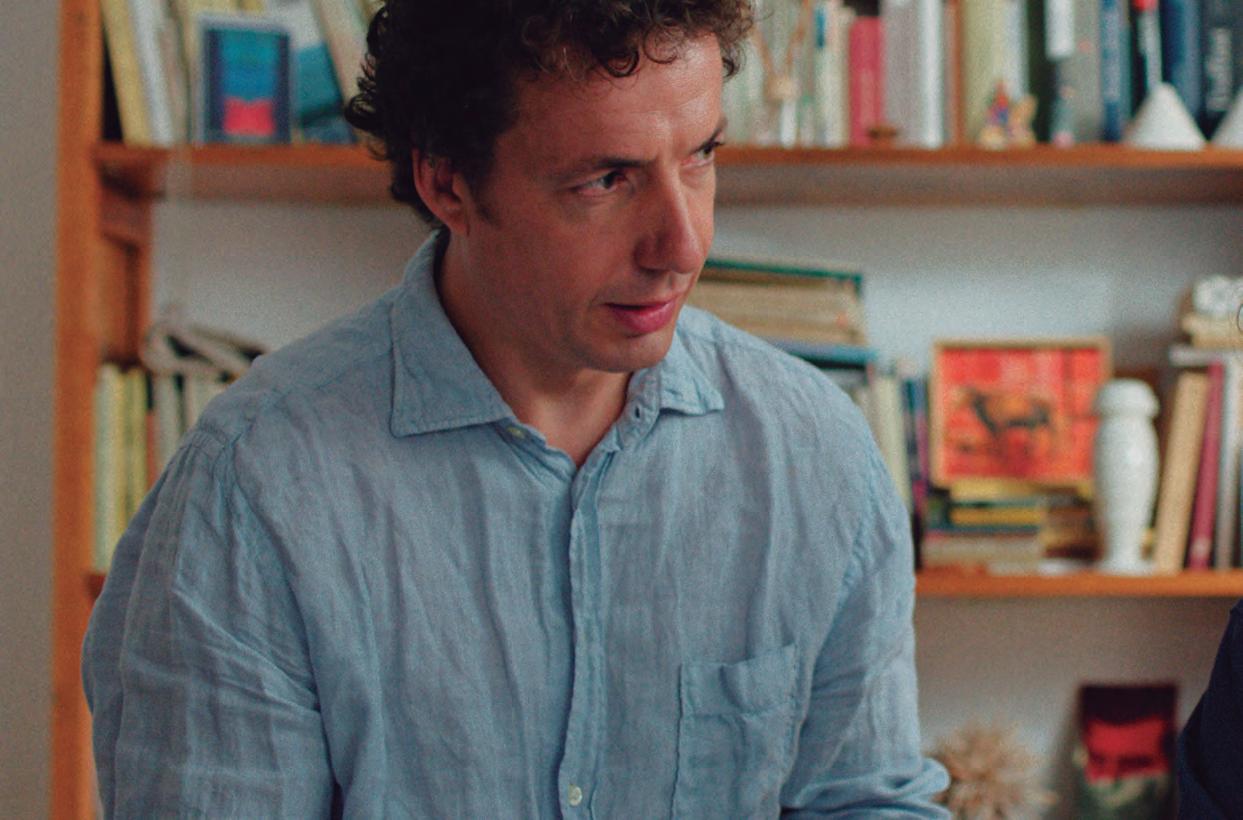
SPAIN HAS A PROMINENT PRESENCE IN THIS CANNES BUT NOT WITH FILMS. THE MAIN SELECTED FILM THIS YEAR IS THE NEW JONÁS TRUEBA FILM, THE OTHER WAY AROUND (VOLVERÉIS), WHICH PREMIÈRES AT QUINZAINE DES CINÉASTES. BUT THERE ARE TWO MAJOR FILMMAKERS AS JURIES (J.A. BAYONA IS PART OF THE COMPETITION JURY AND RODRIGO SOROGOYEN IS THE PRESIDENT OF SEMAINE) AND JUAN CARLOS FRESNADILLO IS FANTASTIC 7’S GODFATHER IN MARCHÉ DU FILM. CARLOS AGUILAR SAMBRICIO
After massive success with Society of the Snow (La sociedad de la nieve), J.A. Bayona has been honoured with a spot in Cannes Competition Jury. Greta Gerwig is the president and the rest of the jury includes Ebru Ceylan, Lily Gladstone, Eva Green, Nadine Labaki, Pierfrancisco Favino, Hirokazu Koreeda and Omar Sy.
Besides, Rodrigo Sorogoyen will be president of the jury of the 63rd Semaine de la Critique, Madrilenian filmmaker is one of the most fascinating directors in Spain in the last 15 years, thanks to works like Stockholm, May
God Save Us, The Realm, Mother and TV series Riot Police
But it was his last film, The Beasts (As Bestas), the one that helped him to gather global attention. The film, which was screened in Cannes Première, won 9 Goya Awards, including Best Film and Best Director, as well as the César for Best Foreign Film.
Regarding films, the Spanish flagship is The Other Way Around (Volveréis), the new film from Jonás Trueba, whose name is now globally top-tier after The August Virgin, which, among other accolades, was nominated for Best International Film in the Cesars. His new film is a production from Los Ilusos Films, Les films du Worso (France) y Arte France Cinéma, with Memento International handling world sales.
“I think my previous films always had some humor, but here I wanted to address comedy openly. The premise revolves
Completing the podium for Spanish filmmakers in relevant positions we have Juan Carlos Fresnadillo, one of the essential names in the wave of Spanish filmmakers who shocked the world of genre cinema during 90s and first decade of the 21st century, in his case thanks to feature films such as Intacto and 28 Weeks Later. Marché du Film has appointed him as the godfather ot this edition’s Fantastic 7.

around a somewhat paradoxical idea of a couple who decides to celebrate their breakup,” declares Trueba.
What´s the story? After 15 years of relationship, Ale and Alex have an idea that might seem pointless at first: set up a party to celebrate their breakup. This announcement shocks their loved ones, but they remain firm in their decision to separate. Or maybe not?
Rubik has reached Alexandre Moreau, head of sales in Memento to know his opinion on the film:
“It is a sentimental comedy with an engaging plot. Jonás Trueba explores the concepts of love, friendship, and the conclusion of relationships in a witty manner, delivering a fresh and touching character study that will connect with the audience. We’re confident that it will resonate in the international markets, thanks to its modernity”.
We have also talked to producer Javier Lafuente about this film: “Jonás Trueba has managed, inspired by some

Un
Old, Something New, Something
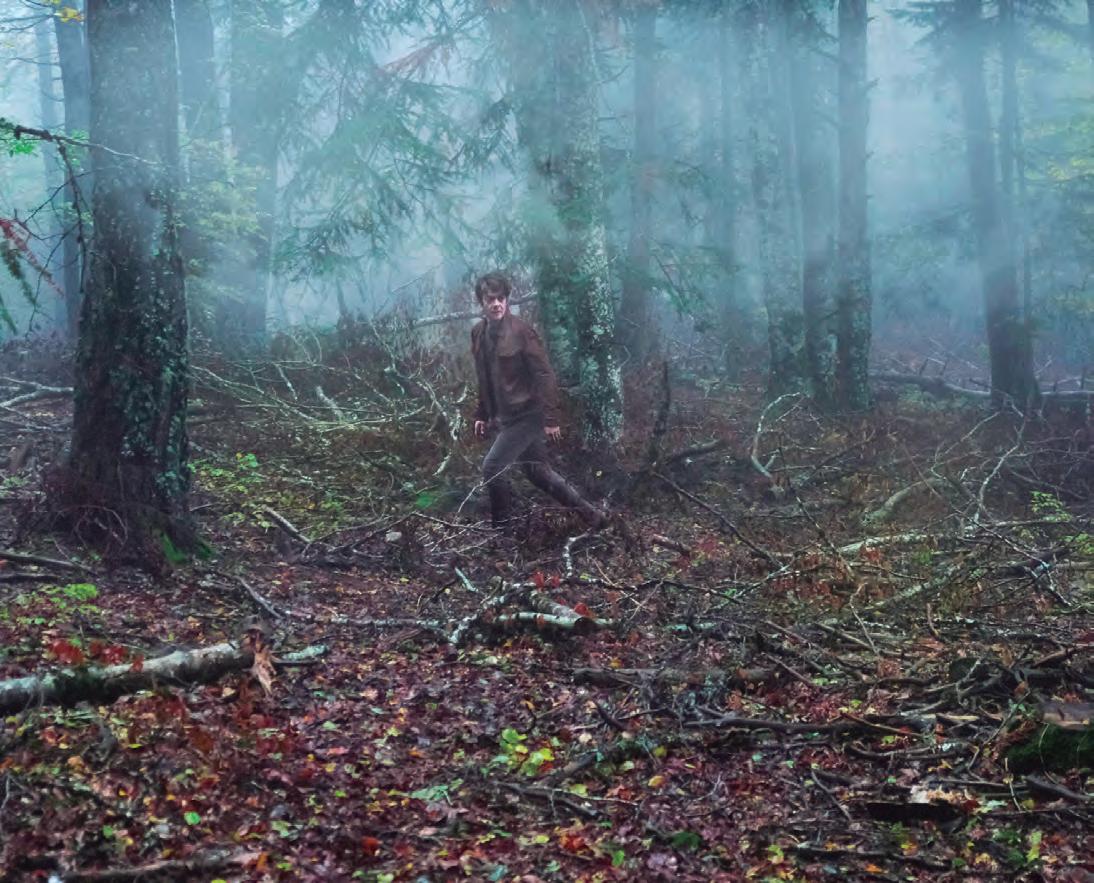
classic Hollywood films from the golden age, to make a classic comedy but from a current perspective, subverting rules. It´s a comedy with a dramatic background; but also a drama disguised as a comedy, in which the protagonist couple is torn between skepticism or the need to continue believing in an idea of love in a time that some are call ‘post-marriage era’”.
The Other Way Around’s premiére at Quinzaine is Monday, May 20 (12:15 pm - Théâtre Croisette - Press Screening; 9:15 pm - Théâtre Croisette - Official Screening), with reruns on Tuesday, May 21 (4:30 pm - Cinéma Le Raimu) and on Friday, May 24 (10:30 pm - Cinéma Les Arcades / Salle 1).
Another interesting Spanish film at Cannes is Southern Brides (Las novias del sur), a 40-minute documentary from Elena López Riera that is shown as a Special Screening in Semaine. It’s worth noting López Riera had her debut feature
film, The Water (El agua), in Quinzaine 2022. Her new work is produced by SUICAfilms (Spain) in co-production with Alina Film (Switzerland).
The story is focused on mature women who talk about their wedding, their first time, their intimate relationship with sex. In repeating these age-old rituals, the director questions her own condition as an unmarried woman with no children, and therefore the end of a mother-daughter chain-relationship.
Producer Rafa Molés has shared some thoughts about the film with Rubik: “It is a pure, minimalist film. It´s an auteur trying to ask personal questions and trying to answer them in cinema. But it addresses a topic that is global:the difficulty of communicating with the mother, sexual-affective education and the weight of tradition. It is a film with the ability to move any person in the world, from the simplicity of a gesture that many of us should have had with our parents”.
There’s only one screening of the film on Sunday May, 19 (Cinéma Miramar, 8:00 pm).
Spanish production Andergraun Films (Albert Serra is one of the cofounders) is one the companies behind Miséricorde directed by Alain Guiraudie (Stranger by the Lake), which will be screened at Cannes Première. Les Films du Losange is handling world sales and main production company is CG Cinéma.
The plot is focused on Jérémie, who returns to his hometown for the funeral of his former boss, the village baker. He decides to stay for a few days with Martine, the man’s widow. A mysterious disappearance, a threatening neighbor and a priest with strange intentions make Jérémie’s short stay in the village take an unexpected turn…
Other Spanish company, Jaibo Films, is part the production of Something Old, Something New, Something Borrowed (Algo viejo, algo nuevo, algo

prestado) along with Un resentimiento de provincia, Protón Cine, Zebra Cine, Oublaum Filmes and Arde Cine. This film directed by Argentine filmmaker Hernán Rosselli is sold by MPM Premium and has been selected in Quinzaine.
In a working-class suburb of Buenos Aires, the Felpetos run a well-established underground sports betting business. Following the father’s death, the family business has become matriarchal. Hernán Rosselli’s reallife childhood neighbour, Maribel, entrusted the filmmaker with her old family videos and agreed, alongside her family, to become a bookmaker in his filmic universe. Game theory and the shape of the network are interwoven with both individual memories and a country’s history.
Rubik has reached the Spanish producer, Miguel Molina , who thinks the film stands out for its photography, hyper-realistic acting and the integration of images in different formats: “The great achievement of the film is that it displays footage filmed 3 decades ago with the same actors,
which allows the director to skilfully edit it to show reality as fiction and fiction as reality.”
“Hernán immerses us in a universal story of searching for the origins, showing a part of Argentine society unknown to the general international audience. Through a plot focused on the domestic mafia of illegal gamblin, the story is built from intimacy, in a search for family answers”, he adds.
ACID sidebar is hosting a Argentine film with co-production of the Spanish company Nephilim Producciones: Most People Die on Sundays. It´s the second feature film by Iair Said and Heretic is handling sales.
The plot revolves around David, a 30-something millenial, overweight, homosexual and with a grappling fear of flying regretfully returns to his native Argentina to attend his uncle’s funeral. There he will reconnect with his mother and his Jewish family, while embarking on a quest across Buenos Aires to quench his anxiety via driving lessons, cheap healthcare and trying to sleep with any man that shows him a little attention.
Main producer, Nicolas Avruj from Argentine Campo Cine, tells Rubik that “there are few movies that take you from crying to laughing without realizing it. Most People Die on Sundays has achieved it. What is special about this trip is that it manages to take you into Iair’s world, leaving you in your same seat, but completely excited”.
Nacho Vigalondo is one of the most innovative Spanish filmmakers with films such as Time Crimes and Colossal. His upcoming film, Daniela Forever, will be part of the Fantastic 7 section in Marché du Film. The Fantastic 7 showcase will be held on Sunday 19 May 2024 | 12:0013:50 (Palais K, Palais des Festivals)
The film stars Henry Golding (Crazy Rich Asians) and Beatrice Grannò (The White Lotus, season 2), and it´s produced by Sayaka Producciones, in co-production with Wrong Men, Señor y Señora, Mediacrest Entertainment and XYZ Films. The latter also handles world sales. This dystopian movie raises this question: If every night you could dream what you want, what would be the point of being awake?
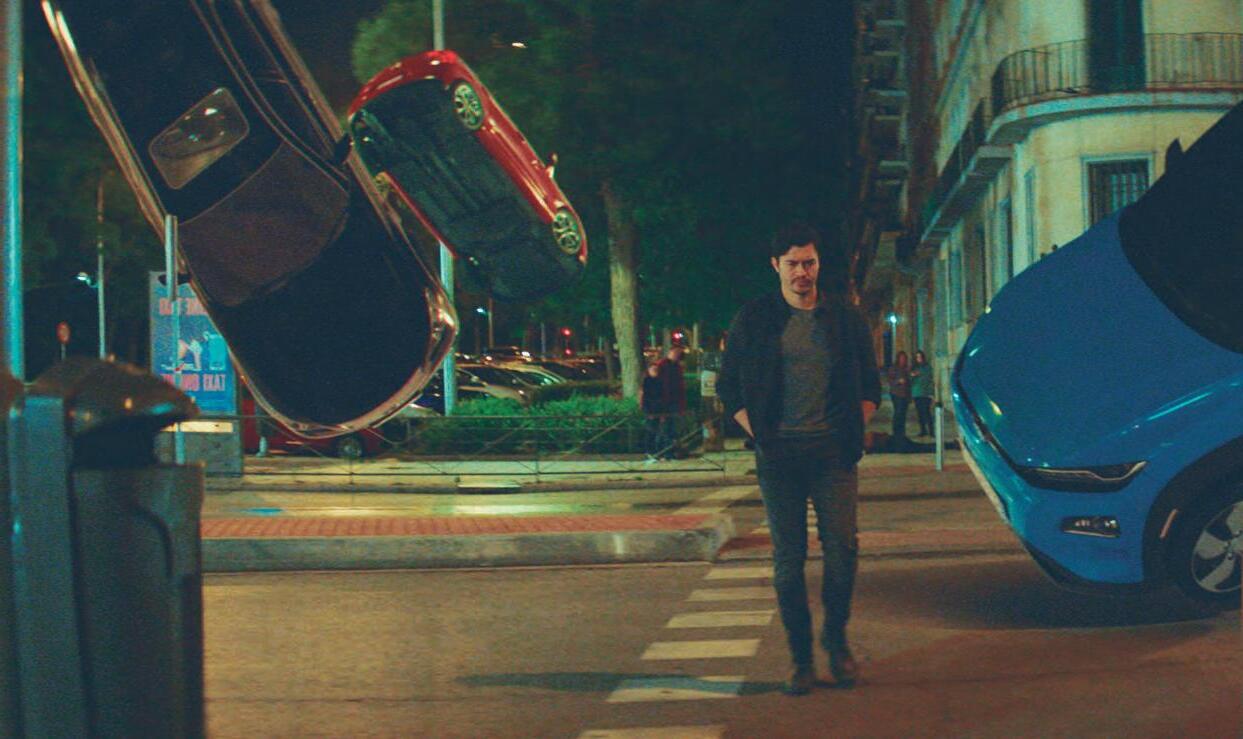
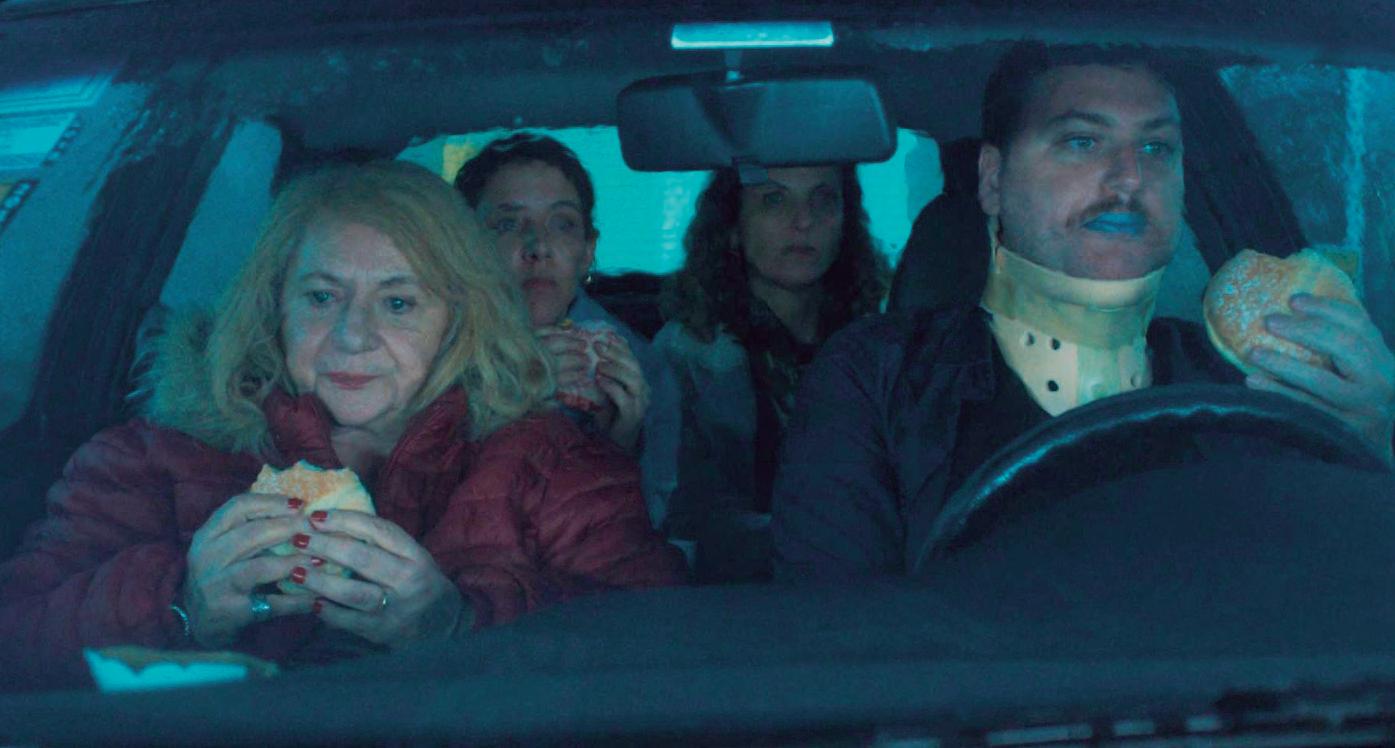
What´s the story of the film? When Nicolas is invited to a clinical trial allowing participants to control their dreams, he takes the plunge in hopes of recovering from the tragic loss of his girlfriend, Daniela. But as his lucid dreams bring Daniela back to him, Nicolas becomes obsessed with the fantasy world that he’s created and finds that his dreams aren’t as perfect as they seem.

Another important section in Marché du Film is Frontières. Spain has a promising project this year (at Proof of Concept) with horror film My Stalker, by Xavier Rull. The Frontières Proof of Concept will be held on Saturday 18 May 2024 | 09:30-11:00 (Palais K, Palais des Festivals).
It´s produced by Monster Box and they are in the stage of financing. They are in talks with some international sales agents but there´s nothing closed yet. They are looking for TV and streamers participation and distribution.
Storyline: A rising young singer in the music industry is stalked by a mysterious dangerous man who can possess people astrally. As she struggles to compose a new album, deal with the pressures of fame, and evade her stalker, she descends into a dark world where music, nightmares, and the supernatural collide.
Xavier Rull has shared more details about this project with Rubik: “It’s a dramatic horror film with an original high concept that explores a girl’s gradual fall into depression. Stalker metaphorically symbolizes this mental illness, an evil force that takes over you, isolates you, and ultimately consumes you. With this film we seek to connect especially with generation Z and millennials”.
“I am committed to quality horror films, with complex characters that provide a renewed perspective on the genre. I claim and champion the brand of ‘Spanish horror’, which had strong
international recognition, although fewer genre films are being made in Spain”, Rull adds.
Spanish Animation is going through an awesome moment. At Cannes, MuKi-Ra will be part of the Animation Day. The Annecy Animation Showcase will be held on Sunday 19 May 2024 | 10:0011:30 (Palais K, Palais des Festivals) .
Mu-Ki-Ra is a project directed by colombian Estefanía Piñeres and produced by Letrario (Colombia) and Abano Producions (Spain) that is expected to be completed in 2025. In a land haunted by monsters made of vegetation, Cleo, a thirteen-year-old girl, will face her worst nightmare when Martín, her little brother, is devoured by one. With the help of Iolo, a magical old lady, she will go to the jungle to fetch Mukira, the monster who took Martín, in order to perform a ritual to bring her brother back. She will soon learn that monsters hide a secret under their foliage and love will flourish even in the most unexpected places.
Rubik has reached the Spanish producer, Chelo Loureiro : “I fell in love with the project because of my interest in producing films for a children’s audience, and also because we always seek to tell stories that reveal unknown lives to the general audience. Estefanía tells us a story full of fantasy that takes place in an area of Colombia where an Afro-Colombian population lives that has nothing to do with our Western culture. It´s a society full of

extraordinary sounds and colors, very different in the visuals but everybody can relate to the characters because their problems are universal”.
At Cannes Docs - The Five Nordics Showcase, there will be a SpanishDanish work-in-progress: Only on Earth (Polar Star Films, Hansen & Pedersen) by Robin Petré. Also, in the Goes to Cannes section , Ventana Sur has selected The Virgin of the Quarry Lake (Mr. Miyagi Films, Ajimolido Films, Mostra Cine, Caponeto) by Laura Casabé, a coproduction between Spain and Argentina.
Spain is taking part of the new section Cannes Remakes. One of the selected titles is Rider , sold by Begin
Again Films. Gloria Bretones, Co-CEO & Co-Head of International Sales –Acquisitions, tells Rubik about it: “We believe that Fío’s story could be that of many: a story of self-improvement, empowerment and full of adrenaline on a bicycle that is unique. Normally social cinema stops at denouncing unfair situations, but Estaregui’s cinema always opens a door of hope”.
Latido Films takes part with Gerardo Herrero’s Under Therapy (Bajo terapia). “It is an intelligent, perfectly structured comedy that works like a clockwork. Behind its humor, it hides a very relevant subject, and a surprising ending”, tells us Antonio Saura, CEO of this sales company.
Filmax is here with Cross the Line (No matarás). “The film worked very well for us at the time in the international market. We think that enough time has now passed that it makes sense to remake a film. It has tension, morbidity, action and is an ideal vehicle for a major actor in the territory who wants to adapt the film, as it was once for Mario Casas in the original version”, says Iván Díaz, head of international sales at Filmax.
To wrap up this article, Cannes Classics will show the 4K restoration of Tasio, the masterpiece from Montxo Armendariz originally released in 1984. The story deals with the childhood, love adventures, and ordinary life of Tasio, a coal maker in rural Navarre.
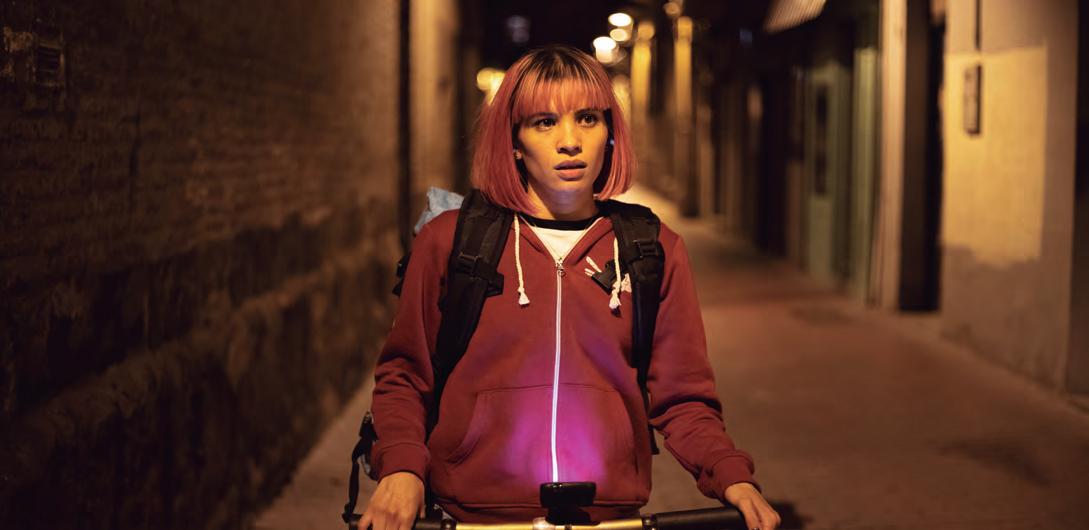


THAN
HE DESERVES. AS IT HAPPENS WITH LUIS GARCÍA BERLANGA, INTERNATIONAL AUDIENCES STILL DON´T HAVE A CLUE OF THE GREATNESS OF HIS LONG CAREER. HE PASSED AWAY LAST YEAR AND WE WANT TO PAY TRIBUTE TO HIS CINEMA IN OUR ISSUE FOR CANNES, ONE OF THE FESTIVALS WHERE HIS FILMS HAD A VERY WARM WELCOME.
In a time where Spanish people were suffering from a dictatorship, Carlos Saura was one of the most prominent artistic ambassadors of Spanish Culture.
Saura won the Golden Bear in 1981 with Hurry, Hurry! ( Deprisa, deprisa ) but he

was also regarded as Best Director twice : in 1966 with The Hunt ( La caza ) and in 1968 with Peppermint Frappé.
He also had a love affair with Cannes He was eight times in Competition for the Palme d’Or. He never got it but some of his movies were awarded: in 1974 Cousin
Angélica achieve the Jury Prize, in 1976 Raise Ravens ( Cría cuervos ) received the Grand Jury Prize and in 1983 Carmen gained the Best Artistic Contribution award.
He also competed three times for the Golden Lion in Venice and two of his films
All of Carlos Saura’s great themes come together in this fascinating film: Falangism / Francoism as the creator of an oppressive atmosphere, the free mixture of past and present, love (or rather, falling in love as the driving force of change), the procedures of memory…
Jose Luis López Vazquez did the most sensitive and brilliant performance of his career. And Luis Cuadrado’s cinematography was inspirational for countless films in the following years. The prodigious beauty of this film, which uses silence in a poetically eloquent way, remains as modern today as when it was released.
Isabel Coixet is one of the most important contemporary filmmakers in Spain. She’s been in Cannes Competition with ‘Maps of the Sound of Tokyo’. Some of her most acclaimed films are ‘My Life Without Me’, ‘The Secret Life of Words’ and ‘Un amor’.
CARLOS AGUILAR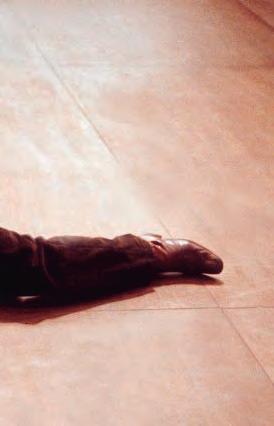
were nominated for Best Foreign Film in the Oscars ( Mama Turns 100 and Carmen ).
Some film lovers around the world may have watched a film like Raise Ravens and maybe Peppermint Frappé. But his movies in the 60s and 70s, despite having been so well regarded in festivals, are now forgotten.
His musicals and flamenco films are more popular, probably because of exotic reasons. The truth is he indeed have a unique approach to musicals. Actually, Robert Wise (West Side Story, The Sound of Music) once told him he had invented a new path in musicals and that he had follow it. He did. His late career was full of musical films. Maybe this fact has overshadowed the memory of his early acclaimed era but it´s about time his cinema finds a spot in the Spanish pantheon along with Buñuel, Berlanga, Erice and Almodóvar.
We’ve talked to Carlos Reviriego, Deputy Director & Head of Programming in Filmoteca Española, to know about his take on this masterful filmmaker.
Regarding his main contributions to Spanish Cinema, Reviriego believes “he has been one of the few great aesthetes that Spanish Cinema has had”. The visual force
Raise Ravens (Cría cuervos) has been an essential film in my cinema education. It is a mysterious and fascinating film, deeply poetic and oscillating between fantasy and reality through the eyes of a girl, with that wonderful Ana Torrent’s gaze. Unlike many films about childhood, Raise Ravens flees from the idea of childhood as a bright and safe place and composes a portrait full of suffocation, trauma, ghosts and pain.

I always remember its stealthy camera movements, as if the camera were another ghost that walks through the rooms of the silent house, which works as a metaphor for the subconscious of that girl marked by loss and daily repressions. That suffocation, that feeling of things shut down, is the perfect domestic representation of the repression of Franco’s Spain.
Clara Roquet is the director of ‘Libertad’, premièred at Semaine de la Critique in Cannes 2021. She’s written other films selected in Cannes like ‘Creatura’ or ‘Petra’.
of his cinema is “almost unique, perhaps only comparable to what Portabella, Almodóvar, Zulueta and Erice have achieved with their films”.
“He was a thorough filmmaker (talented writer and photographer), who perpetuated the Buñuelesque tradition and even the concept of “Españolada” to propel it towards the modernity of Spanish cinema. He was a key filmmaker in the establishment of that modernity, an essential bridge in Spanish cinema to maintain the memory of repression while breaking its limitations and opening new paths. I think its cultural relevance is impressive in that sense”, he adds.
Saura’s allegorical cinema of the late Francoism is highly regarded. We asked Reviriego to pick one underrated Saura’s Film and he chooses Goya in Bordeaux : “It is probably his last masterpiece, with a truly impressive Paco Rabal and superb production design (Luis Ramírez) and cinematography (Storaro), which are now out of fashion in Spanish cinema. Saura’s own script is prodigious, working as the culmination of his poetics aimed at blurring the limits between the dreamlike and the empirical, the visible and the invisible, and breaking the space-time boundaries provided by film language”.
I got the feeling his musicals are better considered abroad. Reviriego thinks it´s
possible considering their exotic elements but he says he was also acclaimed in Spain with Blood Wedding and the flamenco trilogy. “In any case, I believe most of his films are musical, even before making strictly musicals. Dance and music are all over his cinema. If we think about it, it has not stopped carrying a genre like the Spanish cultural folklore into the 21st century, reconquering, stylizing, mixing and renewing the most popular traditions of our cinema”, he comments.
Has Saura been influential to younger generations in Spain? Reviriego states his 70s movies have had an impact, especially films like Raise Ravens, Cousin Angélica, Peppermint Frappé, Mama turns 100 or The Garden of Delights. Also Hurry, Hurry! for filmmakers into commited cinema. Some of the names he mentions are Clara Simón, Elena López Riera, Pedro Aguilera, Javier Rebollo, Félix Viscarret, Jonás Trueba, Javier Ambrossi and Javier Calvo, Juan Vicente Córdoba or Paula Ortiz. “I think that all of them owe him something both aesthetically and narratively”, he declares.
In the next pages, we pay homage to Carlos Saura’s cinema highlighting 12 of his best films. All of their rights are owned by Video Mercury, except for the debut feature film, The Delinquents (Los golfos), whose rights belong to Films 59, Pere Portabella’s production company.
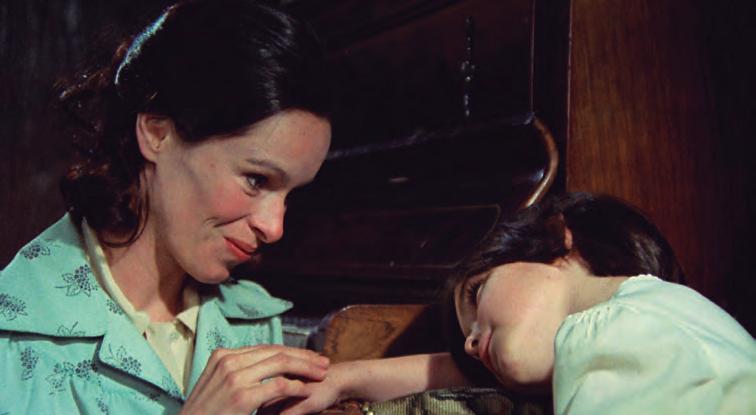
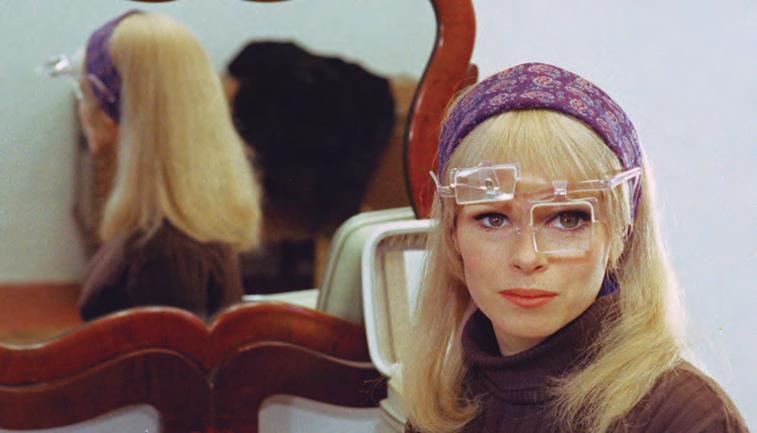

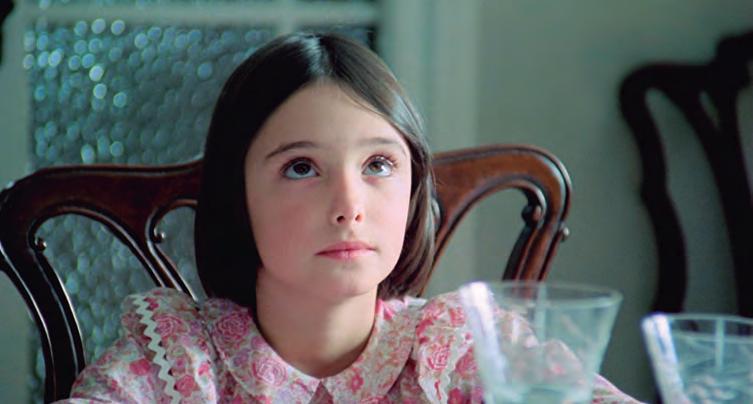
In the twilight of Francisco Franco’s dictatorship, 8-year-old orphan Ana and her two sisters go to live with their aunt. The young girls try their best to get used to the new reality against the backdrop of a caged childhood. Ana seeks solace by mixing memories with fantasy in her dimly-lit room, and she develops a morbid relationship with her mother’s ghost.
Cautious Julian is content with his ordinary life, until he meets up with his adventurous friend Pablo, who wants to introduce Julian to his new fiancée, Elena. Almost immediately, Julian becomes obsessed with the free-spirited Elena, and although she allows him to show her around, she has no interest in him. He then turns his attention to the meek nurse Ana, and tries to make her more like Elena.
Three friends and the young relative of one of them plan to enjoy a pleasant day of hunting in a private preserve. Personal problems and tensions between them will surface until the day turns into hell, as a reflection of the battle that took place in that same preserve during the civil war.
Luis, an elderly writer who has been separated from his family for years, has fallen ill, but his children have decided to travel to the countryside to visit him on what may be his final birthday. Though she hasn’t spoken to her father for nearly a decade, Elisa has agreed to come as well, to at least get away from her husband if not to be with Luis. When her sister Isabel leaves, however, Elisa stays and looks to her father for guidance.
When his mother dies, aging bachelor Luis travels to Segovia, Spain in order to bury her alongside her family. While there, he stays in the very house where he spent the duration of Spanish Civil War, which inevitably brings back a flood of memories both good and bad. Chief among these is his recollection of the love he once had for his cousin, Angelica, who, as luck would have it, is living downstairs with her family.
Angela is a young waitress who turns her back on society when she meets and falls in love with Pablo, a reckless criminal delinquent. Along with Pablo’s gang of car thieves, the pair embark on a drug- and disco-fueled robbery spree as they hurtle toward oblivion.
Antonio is a choreographer who falls madly in love with the star of his flamenco-infused production of ‘Carmen’. While his feelings for Laura are strong, he cares just as strongly about the show. On top of his fierce emotions, Antonio is confused about the proper direction for the performance. Before long, his affection mutates into jealousy, and the lovers’ tale begins to reflect the famous tragedy of the opera they perform on stage.
Julián, Ramón, Juan, el Chato, Paco and Manolo are a bunch of scoundrels who live in a suburban ghetto of Madrid. To help Juan get enough money to debut as a bullfighter, the gang commit little robberies.

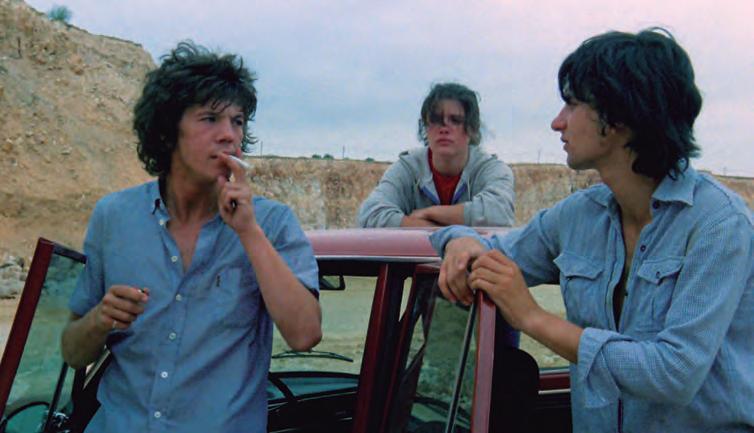


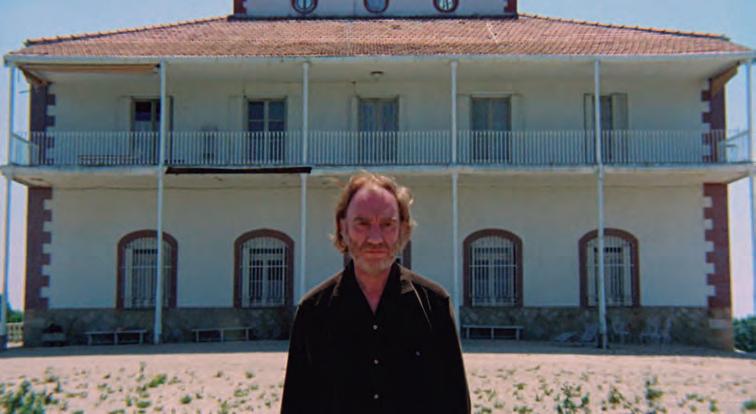



Ana is a young English woman who arrives at a remote Spanish estate in order to work as a governess for three girls. What she finds is a hothouse of dysfunction, perversion, and warped family relationships that lays bare the psychological trauma of life under an authoritarian regime.
Ana and her husband Antonio arrive in the manor in the countryside of Spain where she worked as a nanny many years ago, for the centennial birthday of the matriarch. The family wants to sell the house and the land to developers, but Mama, who actually owns the property, refuses to cooperate.
A bride elopes with her lover on the very day of her wedding. The groom follows the two lovers, and a knife fight takes place. The rivals stab each other and the only wedding that takes place is that one knotting their destinies together in death. A blood wedding.
Carmela and Paulino are entertainers during the Spanish Civil War. They travel the country with their young, mute sidekick, Gustavete, and perform for the Republican troops. They’re also fiery patriots, which puts them in danger when they’re captured by Franco’s soldiers during their tour. But instead of death, they’re sentenced to perform for their enemy, putting their loyalty on the line in the face of survival.

MARCHÉ DU FILM 2024

THE NEW EDITION OF THE MARCHÉ DU FILM, THE CANNES FESTIVAL MARKET, WILL TAKE PLACE AT THE PALAIS DES FESTIVALS ET DES CONGRÈS IN CANNES FROM MAY 14 TO 22. EVERY YEAR MORE THAN 14,000 AUDIOVISUAL PROFESSIONALS ARE GATHERED. IN THIS ARTICLE WE FOCUS ON THE SPANISH DELEGATION THAT ATTENDS THIS YEAR AND THE ACTIVITIES THEY PROMOTE TO DEVELOP BUSINESS OPPORTUNITIES.
Once again, ICEX and ICAA organize the Spanish participation under the Cinema from Spain umbre-
lla. The Spanish Pavilion (Riviera A3A5) hosts Latido Films, Feelsales, Begin Again Films, Sideral Cinema, Con Un Pack / Cinema Republic, Canary Islands
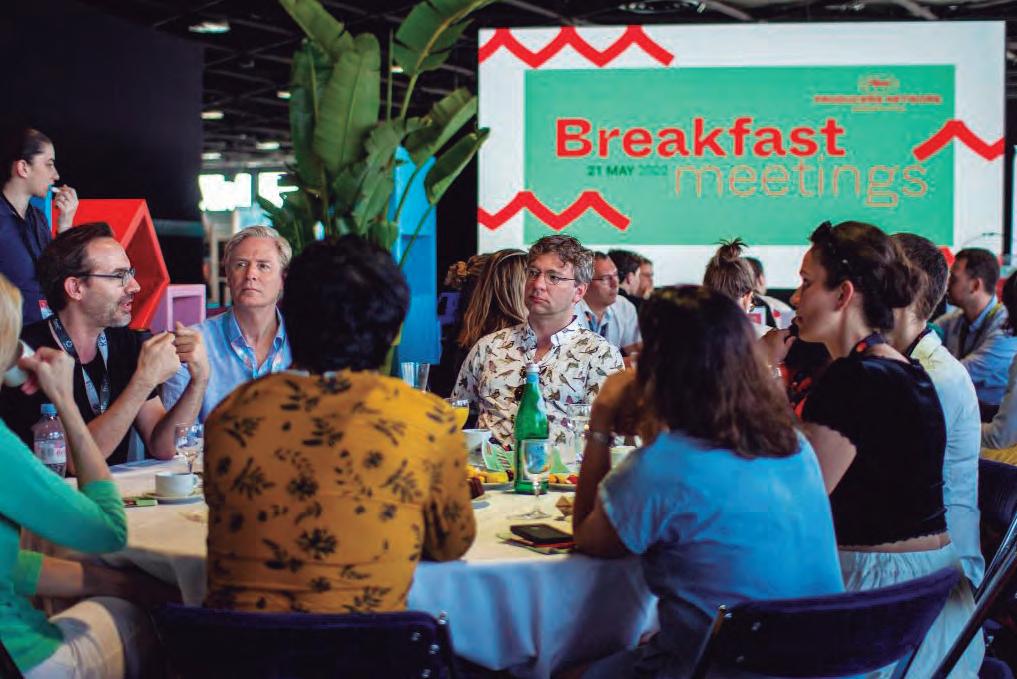
Film, Basque.Audiovisual., Bendita Film Sales, EGEDA / The Film Agency, Canary International Pictures, Cinema from Spain and Spain Film Commission.
Very close to the pavilion, there are other Spanish companies and bodies with their own booth, such as Catalan Films on Riviera A4 and the sales company Filmax on Riviera A1. Sales company Film Factory will host buyers at the First Croisette residence, right in front of the Palais (3/4 Boulevard de la Croisette), Apartment 602.
Among the Marché du Film activities with Spanish participation, the Producers Network (May 15-20) stands out, an area that welcomes more than 400 producers from around the world for a series of meetings and networking events.The Spanish producers will be Valérie Delpierre (Inicia Films), Mireia Graell (Ringo Media), María Carla del Río (Fasten Films), José Alba (Pecado Films) and Claudia Salcedo (Banquete Films).
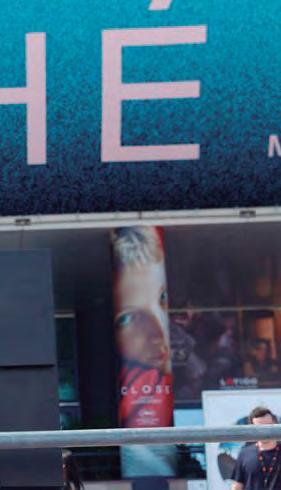
Within the framework of the Producers Network, Cinema from Spain organizes a case study + networking cocktail on May 17 (5:30 pm – 7:00 pm) at the Producers Club (Lérins). Under the title ‘Co-Producing Together: Spain-Mexico, a natural alliance’, the key points for co-producing between the two countries are addressed based on the case study of Andrea’s Love by Manuel Martín Cuenca. Jorge Castellanos from LAZONA and Jose Luis Mejia Razo from Alebrije Cine y Video will participate.
This year, Spain has been one of the countries selected (along with Canada and Greece) to be part of the Co-Pro Social Club Sessions within Cannes Docs. In the case of Spain, on May 18 (The Viewpoint, Lérins) four selected production companies will have the opportunity to present their company and their projects in development in search of international co-production: Omar Al Abdul Razzak (Tourmalet Films), Carlota Coloma (15-L Films), Beli Martínez (Filmika Galaika) and Ricard Sales (LaCima Producciones).
At the Cinema from Spain pavilion (17-20 may) networking breakfasts will be organized for Spanish producers with delegations from Canada, Colombia, Brazil, Chile and Uruguay to strengthen ties between countries and increase opportunities for collaboration and co-production.
Catalan Films has set up a Sales Agent Networking Lunch, in order to help Catalan production companies to connect with sales agents. Also, a Co-Production meeting with Brazil to encourage relations between Catalan companies and this territory.
On May 17 at 3:00 pm at The Viewpoint (Lérins), Shooting in Spain, a brand of ICEXInvest in Spain, presents ‘How to Craft a World Hit in Spain’, which will address why Spain has become a priority option for attracting international filming.
In the Spanish Cinema at Cannes we have already talked about how Spain has a great role in the new section of Cannes Remakes (May 20 at the CNC Beach between 11:00 am and 12:30 pm). As we explained there, the three companies selected by ICAA are Latido (Under Therapy), Begin Again (Rider) and Filmax (Cross the Line).
Also, we’ve previouly addressed the participation of Spain, thanks to the support of the Sitges Festival and ICAA, in the Fantastic 7 section. The showcase will take place on Sunday, May 19, with Juan Carlos Fresnadillo as godfather. The Spanish representative is Daniela Forever directed by Nacho Vigalondo (Time Crimes, Colossal).
For the fourth consecutive year, the 2Cool4School program, an initiative organized by ICAA, ICEX and the Short Film Corner of MAFIZ Málaga, will take four film school students to participate in training and networking activities at the Short Film Corner in Cannes. Besides, Catalan Films has organized a breakfast with short film festival programmers at the Short Film Market.
Regarding cocktails, Cinema from Spain’s Happy Hour is on May 19 in the pavilion itself. Additionally, the Cannes Docs Happy Hour (May 18) is sponsored by Cinema from Spain. Invitation is required, courtesy of Cinema from Spain. Also, as usual, Catalan Films is having a Networking Cocktail at the Catalan booth (Riviera A4) on Saturday May 18 (12:30 pm).
It is also worth noting that, for the first time, the Spanish sales company Sideral Cinema will give a Goes to Cannes Award, meaning a minimum guarantee of 10,000 euros. Additionally, the second edition of Fantastic Latido is being held at Fantastic Pavilion. Organized together with the Spanish sales company Latido Films, the initiative rewards a completed film or a film in the work in progress stage with 10,000 euros in exchange for the international sales rights.
Finally, we want to highlight the participation of some Spanish professionals in Marché conferences. Samuel Castro, director of Iberseries & Platino Industria, will be at ‘From Telling Stories to Playing Stories’ (May 16 at 5:00 pm at the Palais Stage (Palais -1) & Online) which tackles the similarities and differences between stories created in film/television and video games.
On the other hand, within the Streamers Forum, Joan Sala, co-director of Acquisitions at Filmin, will be in ‘Engaging Audiences for Independent Films: Navigating Theatrical vs. Platform Release in European Indie Streaming’ (May 19 at 12:15 p.m. at Plage des Palmes).
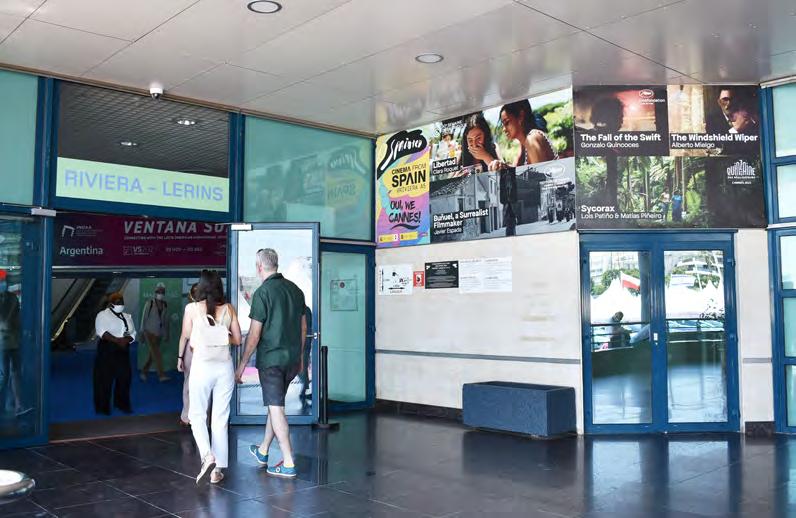
As Neves
May 17th (Fri) 6:00 pm @ Palais C
May 18th (Sat) 6:00 pm @ Palais C (online)
Fraternity (El aspirante)
May 18th (Sat) 9:30 am @ Palais C
May 19th (Sun) 9:30 am @ Palais C (online)
New Earth (Nueva Tierra)
May 16th (Thu) 9:00 am @ Palais D
May 17th (Fri) 9:00 am @ Palais D (online)
Rider
May 18th (Sat) 9:30 am @ Palais E
May 20th (Mon) 9:30 am @ Palais E (online)
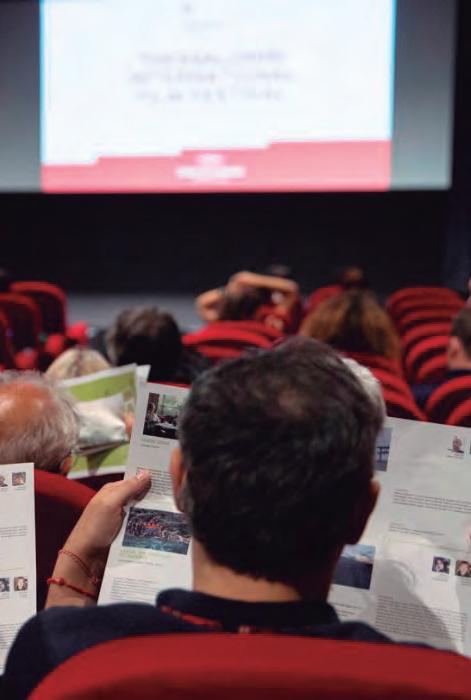
Amal
May 16th (Thu) 11:30 am @ Palais F
May 18th (Sat) 12:00 pm @ Palais C
El Paraíso
Feb 17th (Fri) 12:00 pm @ Palais G
Memories of a Burning Body
(Memorias de un cuerpo que arde)
Feb 17th (Fri) 6:00 pm @ Riviera 1
Feb 19th (Sun) 12:00 pm @ Palais I
The Major Tones (Los tonos mayores)
May 16th (Thu) 5:30 pm @ Palais D
The Hyperboreans (Los hiperbóreos)
May 16th (Thu) 3:00 pm @ Théâtre Croisette (Press screening)
May 17th (Fri) 3:30 pm @ Théâtre Croisette (World Premiere)
May 17th (Fri) 7:00 pm @ Cinéma Alexandre 3 (Festival Screening)
May 18th (Sat) 9:00 am @ Lerins 2
May 18th (Sat) 11:30 am @ Cinéma
Les Arcades 1 (Festival Screening)
A House of Fire (Una casa en flames)
May 17th (Fri) 12:00 pm @ Lerins 1
Checkmates (Menudas piezas)
May 14th (Tue) 12:00 pm @ Lerins 1
Free Falling (Caída libre)
May 15th (Wed) 12:00 pm @ Lerins 1
Valley of Shadows (Valle de sombras)
May 15th (Wed) 9:30 am @ Lerins 1
May 18th (Sat) 9:30 am @ Lerins 1
Stories (Historias)
May 18th (Sat) 11:30 am @ Palais F
Rapa
May 19th (Sun) 11:30 am @ Palais B
A Moroccan Affair (Ocho apellidos marroquís)
May 15th Wed) 4:00 pm @ Palais C
Birds Flying East (Pájaros)
May 16th (Thu) 3:30 pm @ Palais D
Birth (Alumbramiento)
May 15th (Wed) 9:30 am @ Palais C
May 18th (Sat) 3:30 pm @ Palais D
Ellipsis (Puntos suspensivos)
May 17th (Fri) 2:00 pm @ Palais G
Maybe More (Et plus si affinités)
May 18th (Sat) 11:30 am @ Palais B
Nina
May 16th (Thu) 11:30 am @ Palais B
May 19th (Sun) 9:30 am @ Palais C
Norbert(a)
May 16th (Thu) 9:30 am @ Palais C
Robotia
May 14th (Tue) 4:00 pm @ Palais C
May 17th (Fri) 11:30 am @ Palais B
The Chapel (La ermita)
May 15th (Wed) 12:00 pm @ Palais E
We Treat Women Too Well (Tratamos demasiado bien a las mujeres)
May 17th (Fri) 9:30 am @ Palais C

Aire: Just Breathe (Aire)
May 16th (Thu) 8:00 pm @ Olympia Cinema 3
La Casa
May 19th (Sun) 5:30 pm @ Lerins 4
Little Loves (Los pequeños amores)
May 14th (Tue) 4:00 pm @ Lerins 3
Latido Films Promo Reel
May 14th (Tue) 9:30 am @ Lerins 1
Night Silence
May 14th (Tue) 2:00 pm @ Palais I
Saturn Return (Segundo premio)
May 16th (Fri) 12:00 pm @ Palais I
They Will Be Dust (Polvo serán)
May 20th (Mon) 11:30 am @ Olympia Cinema 7
What We Wanted to Be (Lo que quisimos ser)
May 19th (Sun) 2:00 pm @ Lerins 1
Hate Songs
May 19th (Fri) 6:00 pm @ Olympia Cinema 6

AFTER WE UNDERTOOK AN IN-DEPTH EXAMINATION OF THE SPANISH CINEMA AT CANNES, NOW IT’S THE TURN FOR LATAM AND PORTUGAL. AS WE SAID IN THE BEGINNING OF THE ISSUE, THERE ARE A COUPLE OF FILMS IN PORTUGUESE AT THE GOLDEN PALM COMPETITION (MOTEL DESTINO AND GRAND TOUR)
BUT THE ONLY FILM IN SPANISH IS MADE BY A FRENCH, JACQUES AUDIARD (EMILIA PÉREZ). THAT´S IRONIC. ANYWAY, THERE ARE MANY INTERESTING IN SECONDARY AND PARALLEL SECTIONS
CARLOS AGUILAR SAMBRICIO
In this issue we have talked to Cinema do Brasil (see the article in following pages) because Brazil is again a powerhouse in cinema after Bolsonoro’s departure. Besides Motel Destino in Competition, they have some other nice selections at Cannes 2024.
Semaine is hosting the world première Baby, second feature film by Marcelo Caetano. M-Appeal is handling sales for this movie produced by Cup Filmes, in co-production with Plateau Produções, Still Moving, Circle Films, Kaap Holland, Desbun Filmes and Epicentre Films.
The plot is centered on Wellington who has been in a juvenile detention center, After being released, he finds himself alone
and adrift on the streets of São Paulo, without any contact from his parents and lacking the resources to rebuild his life. He encounters Ronaldo, a mature man, who teaches him new ways of surviving. Gradually, their relationship turns into a conflicting passion.
Producer Iván Melo tells Rubik “it’s a film about neoliberalism, the disintegration of community life, and individualism. The movie takes place in the old downtown area of São Paulo, a place that once symbolized the financial power of the largest city in South America but has long been abandoned by the state and left to fend for itself. It’s a simultaneously dazzling and dangerous, vibrant and indifferent place. It’s here that Baby must navigate, forge
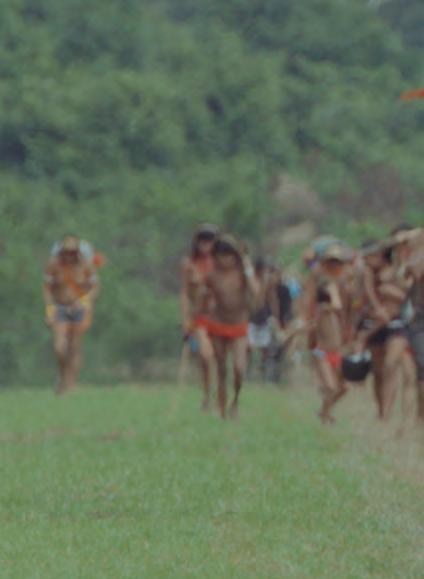

bonds, find new families, and seek solidarity to move forward. He needs to make connections even if they are sometimes as chaotic as a city of 20 million inhabitants”.
He meets Ronaldo and, together, they need to overcome the hardships of daily life and go through a conflicted passion. “It’s like a boxing match or a voguing challenge to understand who they are in this clash of opposites. But Baby keeps dreaming and walking”, Iván adds.
On the hard, we have documentary The Falling Sky , directed by Eryk Rocha & Gabriela Carneiro da Cunha, in the
Quinzaine competition.Based on the cult book ‘The Falling Sky’, by Davi Kopenawa, its sales are handled by Rediance.
The story deals with a famous shaman and symbol of the Amazonian people’s struggle against gold mining and forest exploitation. The film, with a distant approach, places us in the heart of the rituals of the Yanomami people and their relationship with the sacred.
We don´t want to ignore short films. Semaine is screening The Girl and The Pot, directed by Valentina Homem. In a dystopian world, a girl breaks her ceramic pot, which holds a secret within. The breaking of the pot opens portals to a parallel universe and the girl enters a time of transformation in which the creation of a new world is finally possible.
Thierry Frémaux, Cannes Film Festival’s general delegate, expressed solidarity with Argentine cinema during the press conference for the films annoucement. Also, Julien Rejl, Quinzaine’s general delegate, said the films they saw were notable: “Argentina’a industry is currently under threat, despite the fact that it is teeming with unique and exciting filmmakers”.
Two of their main films this year are already covered in our Spain at Cannes article since they have Spanish coproduction: Something Old, Something New, Something Borrowed by Hernán Roselli (Quinzaine) and Most People Die on Sundays by Iair Said (ACID).
The other relevant title is Simon of the Mountain, debut film by Federico Luis
Tachella that will première at Luxbox handles sales for this film produced by 20/20, Planta, Mother Superior and Twelve Thirty Media.
The film circles around Simon, 21 years old man. He introduces himself as a mover’s helper. He claims not to know how to cook or clean the bathroom, but he does know how to make a bed. Recently, he seems to have become a different person…
Producer Patricio Álvarez tells Rubik that it´s an innovative for its cast, plot and its not condescending approach: “The director dwells on details for uncomfortable moments, revealing emotions with which we can empathize”.
“Simon of the Mountain is about youth and the need to feel free, to rebel against what others expect of us, it is about having fun and wanting and looking for allies”, he adds.
Also, short film Our own shadow , directed by Agustina Sánchez Gavier, will be screened at Quinzaine . It’s an atmospheric film that flirts with genre, in which one mysterious disappearance follows another. Different destinies intersect in the forest, as ecological disaster looms in the background
Chile is always a country to watch. Quinzaine is showing this The Hyperboreans , the new film by Cristóbal León and Joaquín Cociña, the guys behind The Wolf House, a film that won the Caligari Award at the 68th Berlinale in 2018. Bendita Film Sales is in charge of world sales for this film made by León &

Cociña Films, in co-production with Globo Rojo Films.
The new film is also a bizarre and creative hybrid animated feature mixing puppets, stop-motion and live action. At the crossroads of theatre, science fiction, animation and fabulated biopic, this is the UFO of our 2024 selection: a paranoid delirium inherited from Ruiz and Bolaño, populated by parallel worlds and haunted by the shadow of a Chilean Nazi writer as a demonic figure.
This is bad year for Mexico at Cannes. Their only selection is a short film in Semaine: She Stays, directed by Marinthia Gutiérrez Velazco. What is it about? Throughout a night out in downtown Tijuana, Laura waits for her destiny to arrive.
Lastly, we addressed Portugal selections. As we published in the first article, Miguel Gomes is competing again for the Palme d’Or with Grand Tour.

The other feature film in Cannes 2024 is the hybrid documentary Savanna and the Mountain at Quinzaine. Directed by Paulo Carneiro, the production companies are Bam Bam Cinema (Portugal) and La Pobladora Cine (Uruguay), while the sales are handled by Portugal Film.

It’s focused on the community of Covas do Barroso, in northern Portugal, that discovers that the British company Savannah Resources plans to build the largest open-pit lithium mine in Europe just few meters from their homes. Confronted by this imminent threat, the People decide to organize themselves and expel the company from their lands.
“A British Company wants to exploit a lithium mine and that would be the end of the green village and their peaceful environment. That´s why the villagers fight against a giant corporation. A David and Goliath fight. As an universal subject, the general audience is eager for a fair fight and in terms of film, the genre is a western, the perfect match for this great adventure”, tells Rubik one representative of the sales company, Miguel Valverde.
Portugal also shows a shorf film in Semaine: My Senses Are All I Have to Offer by Isadora Neves Marques.Lourdes and Lana met telepathically using “sensory pills”, a technology that allows access to other people’s sensations from a distance. After months of relationship, Lourdes decides to visit the country house of her parents, Vicente and Carl, and introduce them to her girlfriend.
Quinzaine includes two portuguese short films. One is The Moving Garden by Inês Lima, a sunny comedy and a fairytale around a botanical garden with fantastical overtones. The other one is When the Land Runs Away by Frederico Lobo. This is a hybrid documentary about an area of countryside threatened by a mining operation that has caused a scandal in Portugal.


BRAZIL IS A HOT TOPIC IN FILM AND TV. AFTER POLITICAL CHANGE LAST YEAR, THE NEW GOVERNMENT HAS FIRMLY RESUMED ITS STRONG SUPPORT TO CINEMA. AT CANNES, BRAZILIAN PRESENCE IS RELEVANT. NOT ONLY BECAUSE MOTEL DESTINO BY KARIM AÏNOUZ IS IN CONTENTION FOR THE PALME D’OR, BUT ALSO FOR OTHER FILMS: BABY BY MARCELO CAETANO (SEMAINE), DOCUMENTARY THE FALLING SKY BY ERYK ROCHA AND GABRIELA MONTEIRO DA CUNHA (QUINZAINE), AMARELA BY ANDRÉ HAYATO SAITO (SHORT FILM COMPETITION), SHORT FILM THE GIRL AND THE POT BY VALENTINA HOMEM (SEMAINE) AND BYE BYE BRASIL BY CACA DIEGUES (CANNES CLASSICS). WE TALKED TO MARIA MARTA, CINEMA DO BRASIL’S EXECUTIVE MANAGER, TO GET THE DETAILS ABOUT FILMING STATUS IN BRAZIL.
Cinema do Brasil is a program that promotes the participation of Brazilian films in festivals and supporting commercial activities in various countries. They want to foster co-production and film distribution in foreign territories, and to expand business opportunities for the Brazilian film industry.
Rubik: What´s been the approach for your participation at Marché du Film in Cannes?
Maria Marta: At Cannes 2024, in addition to the films, Cinema do Brasil will participate in the Marché du Film with a booth (Palais –1 – 26.01). For 18 years, the Program has continuously maintained this booth at the Festival’s editions.
The Cinema do Brasil team organizes a schedule of events during the Marché du Film aimed at fostering connections between the Brazilian delegation and international stakeholders. This schedule includes co-production meetings and discussions with funds and international festivals. Additionally, there is a specific catalog prepared by Cinema do Brasil featuring the films and projects that
Brazilian companies are taking to the Marché du Film.
Cinema do Brasil Cannes mission is supported by the São Paulo State Creative Economy Internationalization Support Program (CreativeSP), Spcine, and Rio Filme. Along with a delegation of about 60 companies, including producers, distributors, and festivals, and over 70 professionals. The delegations also includes representatives from the Ministry of Culture’s Audiovisual Secretariat, ApexBrasil and Guimaraes Rosa Institute.
Rubik: What are you main economic incentives in Brazil?
M.M.: There are different incentives in Brazil for the audiovisual industry. The main one is the FSA (Audiovisual Sectoral Fund), managed by Ancine (Brazilian Film Agency). It invests in all stages and activities associated with the audiovisual sector. The FSA’s resources come mainly from CONDECINE, a tax applied to the broadcasting, production, licensing and distribution of film and video works for commercial purposes; service providers that distribute audiovisual content, such as telecommunications companies and pay-tv operators.
In December 2023, the Ministry of Culture and Ancine announced the launch of two public calls for the audiovisual sector, totalling R$320 million. One of the calls is focused on coproduction projects and the other features films with high box-office potential. In February 2024, the same organizations announced the launch of two other public calls, representing an investment of 180 million Brazilian reais to produce new Brazilian films. For this call, the companies will be selected based on their previous commercial and artistic performance on box-office between 2018 and 2022.
A new incentive was created during the pandemic to support the cultural sector during and after this period. Known as Paulo Gustavo Law, a tribute to the famous actor who passed away due to Covid, the legislation provided around 356 million Brazilian reais for cities and states to invest in culture, including audiovisual projects.
Also, Film quotas have been approved by Congress and sanctioned by the president. The other law (Law Project nº 3.696/23) recently approved is related to the quotas for paid television. Another important debate now is the regulation of streaming platforms. After years of discussion, the Federal Senate has approved last month a

law project to regulate the platforms: they must contribute to the FSA, with a tax of 3% over income revenue.
Rubik: Is Brazil a film friendly territory? Because the country has some impressive locations and Banijay has also opened some great studios...
M.M.: Yes, Brazil is investing in promoting its locations and becoming a film-friendly territory. Different regions of the country are creating Film Commissions to attract filming and foster the audiovisual industry. According to a study by Nathália Körössy and Mariana Cavalcanti Falcão (2022), in 2022 there were 15 film commissions in municipal governments and four in state governments.
Two territories will be in Cannes promoting their Film Comissions, in partnership with Cinema do Brasil: São Paulo Film Commission (promoted by Spcine) and Rio Film Commission (promoted by RioFilme).
Banijay just opened 3 studios in São Paulo, with a total of 11 thousand square meters. The biggest one of them (Studio B) has 6,383 square meters, 11 production rooms and 7 dressing rooms, being the largest studio in Latin America.
Rubik: Are you trying to reinforce coproductions with other countries?
M.M.: In Marche du Film 2024, Cinema do Brasil is promoting several co-production meetings with different countries to foster collaboration between Brazilian filmmakers and international filmmakers. The countries selected for this meeting were based on the interests of Brazilian producers and the existence of cooperation agreements. Here are some of the highlights:
Portugal: In partnership with ICA (Instituto do Cinema e do Audiovisual de Portugal), Cinema do Brasil is organizing a co-production meeting. The co-production between Brazil and Portugal is going through a good moment, considering the signing in 2023 of a new protocol between ICA and Ancine (Brazilian Film Agency). With a total of €350.000 available, 6 projects were selected, being three of minority Brazilian production and three of minority Portuguese producion.
Uruguay: In 2023, the Brazilian Film Agency (Ancine) and the Cinema and Audiovisual National Agency of Uruguay (Acau) signed a Cooperation Protocol, with investments of around R$2 million brazilian reais. The public call for projects in now open. Considering this context,
“Banijay just opened 3 studios in São Paulo, with a total of 11,000 square meters. The biggest one of them (Studio B) has 6,383 square meters, 11 production rooms and 7 dressing rooms, being the largest studio in Latin America”.
Cinema do Brasil partnered with Acau to promote a co-production meeting between producers of both countries.
South Africa: A coproduction meeting with South Africa is also in Cinema do Brasil’s agenda. The meeting is promoted by Spcine, which recently signed a Memorandum of Understanding (MoU) with South Africa’s National Film and Video Foundation to support feature film projects in the development phase and work in progress (WIP).
Cinema do Brasil will also have coproduction meetings with Spain, Catalan Film, Colombia and Nouvelle Aquitaine.
Rubik: Where are you going next? In which events will you focus in the coming months?
M.M.: The next event Cinema do Brasil will be attending is the Guadalajara Film Festival, with a delegation of 6 production companies.
In August, we will be present in Locarno Film Festival, where Cinema do Brasil is sponsoring the participation of 2 emerging Brazilian producers in the program Match Me!. Still in the next months, we will organize a mission to San Sebastian Film Festival.
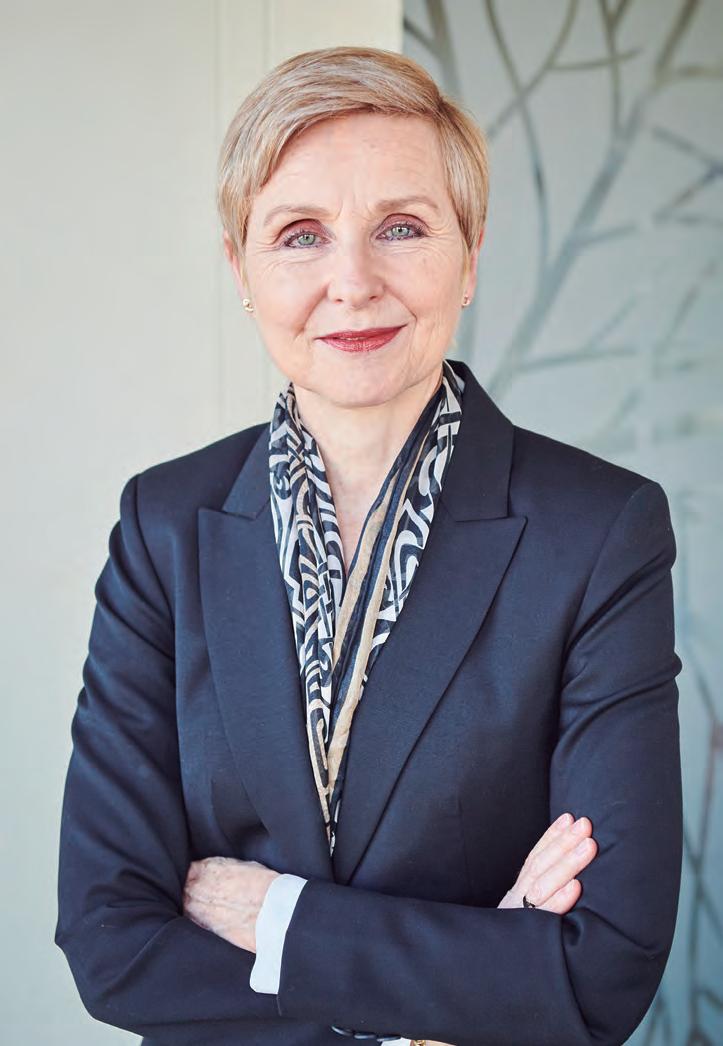
EURIMAGES IS THE CULTURAL SUPPORT FUND OF THE COUNCIL OF EUROPE AND, SINCE ITS CREATION IN 1989, HAS BACKED ALMOS
2,500 FEATURE FILM CO-PRODUCTIONS. RUBIK HAS INTERVIEWED ITS EXECUTIVE DIRECTOR, SUSAN NEWMAN, TO GET TO KNOW THE LATEST NEWS FROM THIS ORGANISATION. CARLOS AGUILAR SAMBRICIO
Rubik: Eurimages has an annual budget of €27.5 million. How’s been the evolution of this budget and what can we expect in the future for the rest of the 20s?
Susan Newman: The budget of Eurimages has always evolved in line with that of the Council of Europe, the parent organization of the Fund. In recent years, the Committee of Ministers, the governing body of the Council of Europe, has applied what is called a ‘zero real growth’ principle to budgets, meaning that they were increased at a representative average rate of inflation.
It is nearly impossible to foresee the evolution of the budget of Eurimages for the rest of the decade, as it cannot be guaranteed that the zero real growth principle will continue to be applied. What we can be sure of is that the number of applications that the Fund receives will probably continue to rise, without an accompanying increase in the budget. The result will inevitably be increased selectivity in project support.
Rubik: Eurimages is 35 years old. Probably, one of the biggest goals of the fund has been to encourage co-productions between member states. Do you think you have fulfilled that purpose and how so?
S.N.: Eurimages has supported 2,464 feature film co-productions, for a total amount of around 701 million euros in the 35 years since the Fund started operations in 1989. Over the same period, the geographical footprint of Eurimages has grown from the original 12 founding European member states to 39 countries today, with 38 European countries and Canada. This expansion reflects the fact that co-production has become a widely used tool of choice and not one simply used out of necessity.
Eurimages has certainly played a role in this, by promoting the concept of coproduction and encouraging producers to integrate their co-producing partners right
“The number of applications that Eurimages receives will probably continue to rise, without an accompanying increase in the budget. The result will inevitably be increased selectivity in project support”
from the development stage. If the everincreasing number of applications for funding we receive is anything to go by, then we have been very successful in fulfilling this purpose.
Rubik: Film production varies enormously from one European country to another. What does Eurimages promote to reduce inequalities between territories?
S.N.: One way of reducing inequality is to have a clear framework setting out the rules when producers from territories with different capacities work together. These rules are usually provided either by a bilateral treaty or
by the revised Council of Europe Convention on Cinematographic Co-production, or by a combination of both. Co-productions supported by Eurimages are in almost all cases official co-productions complying with these rules and so ensuring a basic level playing field between the partners.
A second aspect is that when a country participates in Eurimages, membership of the Fund provides additional opportunities for producers based there, not only in financial terms linked to support, but also by integrating producers in the national industry into a wider community that provides additional opportunities for professional development.
Rubik: You have a scheme for distribution but I feel the circulation of european films is still a pending matter. It´s really rare that cinema goers go watch european films other than the ones from their local country. Don´t you think we still haven´t figured out how to improve this? What can Eurimages do about that?
S.N.: Improving the circulation of European films outside their national
markets has been a very long-standing preoccupation, at Eurimages but also at the level of the European Union’s Creative Europe – Media Programme. When it comes to distribution, co-productions already have a slight advantage, given that more than one territory is involved, but above and beyond this, data from the European Audiovisual Observatory has shown that European coproductions generate, on average, three times as many admissions as purely national films.
“Co-production has become a widely used tool. Eurimages has certainly played a role in this, by promoting the concept of coproduction and encouraging producers to integrate their co-producing partners right from the development stage”
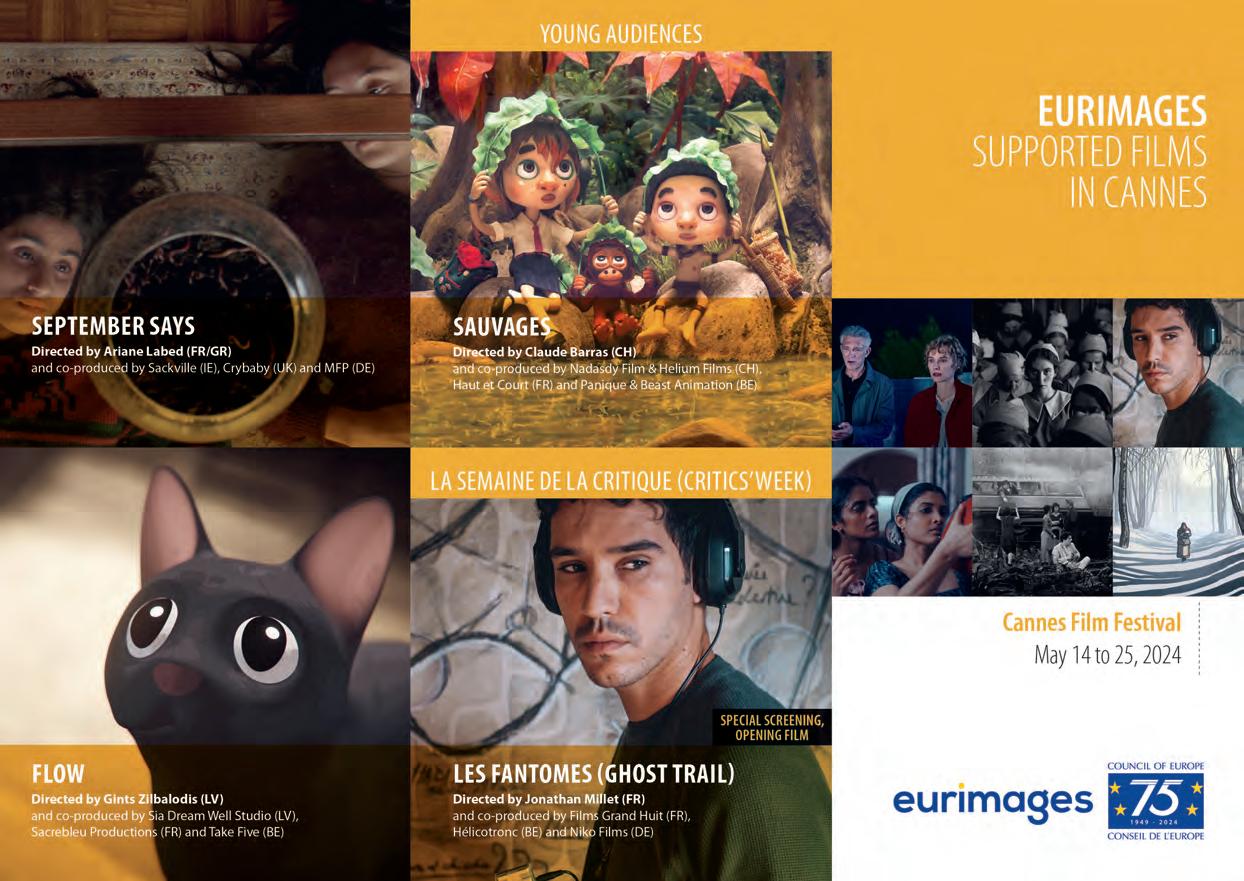
In the past, Eurimages’ support for distribution was mainly focused on distributors operating in countries members of Eurimages but not of the Media Programme. In 2019, the Board of Management of Eurimages decided to suspend the existing scheme but in autumn 2024 a new and differently designed scheme, intended to increase synergies with the Fund’s co-production support programme, will be launched.
Rubik: Your organisation partners with a lot of festivals and labs. Is this co-operation a key aspect for your strategy?
S.N.: The Board of Management of Eurimages, composed of representatives of each of our member States, has always considered that the earlier a feature film project starts integrating co-production aspects, the more organic and more successful the coproduction. So collaboration with markets where these projects take form has always been key.
To this end, the Fund has, since 2010, presented development awards to coproductions through various festivals and markets. Nine markets across Europe are
presenting these awards, worth €20,000 each, during the period 2024 – 2026.
Our Board also has a long-standing interest in innovative projects that cross artistic boundaries, in dramaturgical or conceptual terms. So we launched this year a new version of our Lab Awards, at IFFR Pro in Rotterdam, and CPH:DOX in Copenhagen. The awards consist of an Innovation Award, worth €20,000, for the development of an innovative project in any audiovisual medium, and an Outreach Award, providing €30,000 to be used to help an unconventional film project reach out to its potential public.
Finally, the Fund also provides a series of sponsorships, for activities taking place in festivals that give visibility both to the Fund and to the concept of co-production.
Rubik: What are your main activities regarding Marché du Film, the market for the biggest film festival, Cannes?
S..N.: Like most organisations working in the international film industry context, we value enormously the efficiency of uniting so many key actors of the industry in one place. At Cannes we take advantage of this by consulting
and coordinating with all our partners across Europe and Canada.
We also provide feedback and advice to producers who are preparing an application to the Fund or have already been supported. We offer a networking opportunity by hosting a reception – already famous as a place where co-productions are born! Of course, we also seize the occasion to attend the premieres of the films supported by the Fund – this year we can already look forward to seeing 5 films in official competition, 4 in Un Certain Regard, the opening film in Critic’s Week and a special screening for young people!
Rubik: Historically, Eurimages has been attached to cinema. But TV series are essential now. Outside big TV networks and streamers, there´s a need for funding opportunities for the independent production of series, don´t you think? Is that why you have created the Pilot Programme for Series Co-Productions?
S.N.: The aim of this three-year pilot programme is to support high-quality series made as international co-productions and to empower independent producers. We
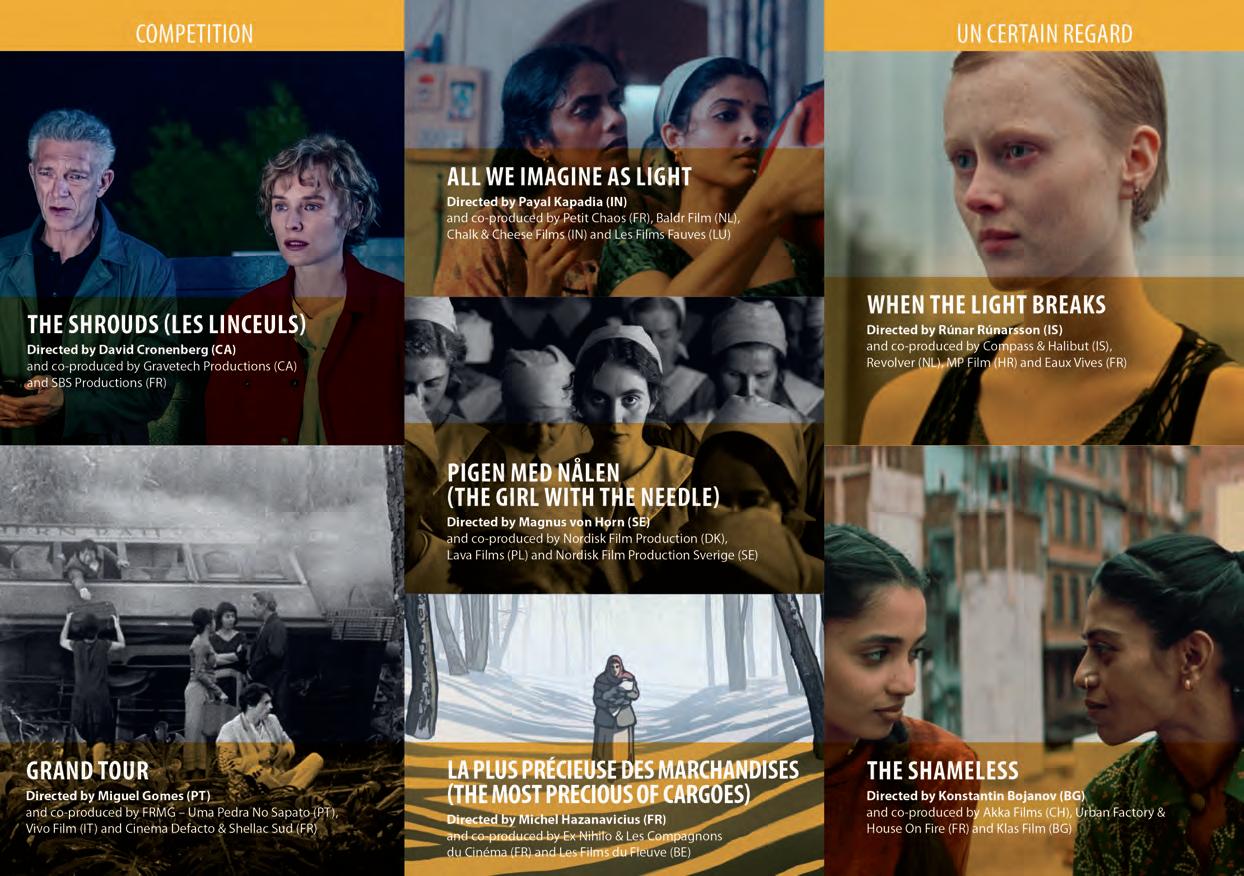

hope it will also nourish independent serial storytelling and boost cultural and linguistic diversity in the sector.
It is important to note that the Pilot Programme for Series Co-productions is an initiative parallel to but not part of Eurimage, though it is of course inspired by the success of Eurimages. In fact, the Pilot Programme is run by the Council of Europe through its voluntary contributions system.
At this stage 15 different countries have become involved, including Spain, and the second call for projects in this three-year pilot scheme has just closed. Two Spanishled series co-productions were among the 7 projects supported in the first round in 2023. In parallel three markets awarded a Series Co-production Development Award on behalf of the Pilot Programme, including Conecta Fiction & Entertainment in Toledo (Spain).
Rubik: Cinema theaters are struggling. After pandemic, they haven´t fully recovered and this year is going really bad
so far. You have an exhibition scheme and you support Europa Cinemas network, but don´t you think there should be done something else in order to save the Big Screen experience and, consequently, Culture??
S.N.: The Board of Management of Eurimages has always expressed its members’ full commitment to the theatrical experience. We recognize that the theatrical experience is unique and continues to represent the very best way for audiences to enjoy films made for the big screen. Films will of course also be enjoyed in other ways, but the experience will be different.
As you mention, the theatrical sector was particularly hard hit by the pandemic, and the recovery pattern for cinemas continues to be quite uneven across our member States. The Eurimages Cinemas Support Programme provides support to a network of cinemas in Eurimages member States that are not part of the European Union’s Media Programme, in close co-operation with our partner Europa Cinemas. Though the
budget available for this activity is relatively limited, we remain committed to supporting the arthouse cinema sector.
Rubik: What´s new for Eurimages in 2024 and what are your plans for the immediate future in terms of new funding programmes or new features in the old ones?
S.N.: The launch of a new programme in autumn 2024 to help co-production projects supported for co-production in reaching out to audiences has already been mentioned.
We are also making strides in implementing aspects of the Sustainability Strategy adopted by our Board of Management in 2022. Since 2023, we ask experts recommending coproduction projects for support to consider in their evaluation the existence of measures implemented by the production teams to reduce the environmental impact of the coproduction.
In parallel, as we see that the level of access to information on green production is quite varied across our member States, we have launched a project with French association Ecoprod to create an on-line learning platform on sustainable production, targeting all those professionals who want to learn more about green production in practice.
“Improving the circulation of European films outside their national markets has been a very long-standing preoccupation (…) In autumn 2024 a new and differently designed scheme, intended to increase synergies with the Fund’s co-production support programme, will be launched”
Finally, under the supervision of our Board of Management, we continue to fine-tune the new project selection mechanism introduced in 2022, whereby we invite industry experts to recommend projects for support. The aim is of course to ensure the highest quality of decision-making possible and the continued success of the Fund.

SOME TIME AGO, FORMER FOOTBALL PLAYER GERARD PIQUÉ COMMENTED ON THE ORIGIN OF A 7-A-SIDE FOOTBALL COMPETITION CALLED KINGS LEAGUE. PIQUÉ MENTIONED THAT HIS CHILDREN WERE UNABLE TO CONCENTRATE FOR MORE THAN TEN MINUTES ON A TRADITIONAL FOOTBALL MATCH, AND CHOOSING INSTEAD TO WATCH VIDEOS AT MOBILE PHONES AND TABLETS. THIS LED HIM TO REFLECT ON OTHER MODELS OF SPORTING EVENTS THAT COULD BE MORE ATTRACTIVE TO THE NEW GENERATIONS.
ROBERTO ALCOVER OTI
Piqué’s idea and its translation to sports is a new example of the audiovisual moment in which we are immersed, prisoners of the sensory overload that is inherent to the triumph of the digital and the consolidation of mobile apps and social networks as mechanisms for human relations.
Returning to this example, the reflections of the former Barcelona player show that we inhabit a present where, in generational terms, more traditional conventions begin to clash (there, football as it has been understood up to now; here, the construction of images that represent us) with new models of consumption: an evolutionary debate that in the field of cinema perhaps had its first stop with the arrival of TV sets at home and later with the advent of the Internet.
But now the gap seems to be much greater. Because never before we can observe such a lack of synchrony between the images that cinema forged and the way new generations consume them.
When in his documentary The Story of Film: A New Generation (Mark Cousins, 2021), its creator talks about slow cinema, it is convenient to think about how to inhabit those images in a world in which there seems to be no time to experience them.
Thus, we live in an audiovisual present that combines Spider-Man: Across the SpiderVerse (Kemp Powers, Joaquim Dos Santos and Justin K. Thompson, 2023), a box office success that pushes our attention system to the limit, with Fallen Leaves (Aki Kaurismaki, 2023), whose parsimonious poetry reminds us that the world could be a place to stand still as well. A present that, on the one hand, awarded in Cannes the three hours
of Inside the Yellow Cocoon Shell (Pham Thien An, 2023), and on the other and, aims to assimilate the saturation of noise, images, sounds and micropayments of video games like Fall Guys or Fortnite. And also a world that is reflected in We’re All Going to the World’s Fair (Jane Schoenbrun, 2021), where a group of lonely people wander for hours every night through eternal loops of videos on YouTube, trying to give their lives a meaning.. Meaning that is built by dissolving images in a multitude of formats, at different speeds that, as in A Glitch in the Matrix (Rodney Ascher, 2021), lead us to another idea of transcendence
Recently, Elena Neira commented in an article that “viewing habits have stopped having the inertia of the past, which made children inherit the habits of their parents. The acceleration of innovation is widening the gap between generations” and names


a study that shows that around 60% of generation Z (remember, that generation born between the mid-90s and the 2010s) prefers User-generated content you find on social media.
Neira refers to how streamers are competing to make their product attractive to these generations: “The long-term strategy to achieve success will probably involve reinventing the services so that they are more personalized, with the possibility of becoming more social and allowing purchases. Providers will also need to expand their focus beyond television and movies to reach modern audiences and make their intellectual property work in social media and video games.”
In this sense, these new audiovisual models aim to achieve the most precious asset: users’ attention. The new strategies seek to ‘hijack’ the viewer, driving them to a world in which stimulation is contant so that it does not allow time for reflection. In his book ‘Clicks Against Humanity’ James Williams reflects on the possibility that technology no longer helps us to be better, but rather takes us away from our best version. As the author himself expressed, “in the long term, they can prevent us from living the lives we want to live and, what is worse, undermine fundamental faculties such as reflection or
self-control, making it even more difficult for us to “want what we want to want”.
Williams emphasizes this reflection by witnessing (he worked for Google for more than ten years) how big tech companies take people to places that make us slaves of an artificial desire. And he highlights that all these new processes build an environment in which digital products and services compete endlessly to capture and exploit the consumer’s attention: “In the attention economy, it is about getting the maximum number of people dedicate as much time and attention as possible to the product or service that one has proposed to sell”.
The stimulation overload through massive amount of content (constant exposure, for example, to notifications on our technological devices) ends up nullifying our ability to process information, turning us into passive users, mere consumers, and also individuals without capacity. to adequately discriminate between that entire ocean of content. The process by which we are shaken up by these mechanisms has been thoroughly developed by writer and journalist Johann Hari in ‘Stolen Focus: Why You Can’t Pay Attention--and How to Think Deeply Again’ which narrates in first person the difficulties experienced (physical and psychological) with progressive overexposure to digital
environment. Hari, who several years ago published one of the most interesting books in the world about drug addictions (‘Chasing the Scream’), constructs a story, at times somewhat naive, about the difficulty of establishing oneself as an autonomous subject, oblivious to digital noise, and reconnect with pause and reflection.
The process that Hari describes takes us to what Herbert A. Simon highlighted in the seventies: “In a world full of information, the information surplus results in a lack of another type, in a scarcity of that which information consumes . And what information consumes is quite obvious: it consumes the attention of its recipients. Thus, information abundance causes a lack of attention and forces this finite attention to be efficiently distributed among the infinite number of information resources capable of consuming it”. And since our attention capacity is finite, we are biologically incapable of processing levels of stimuli that are far above our threshold. This entails the loss of attention, not only as a way of processing information, but as George Franck writes, as the loss of “the essence of the conscious being”. The most relevant result of this trend, aggravated in the current context, is the erosion and cancellation of our ability to reflect, to ‘read’ what we are consuming and give it
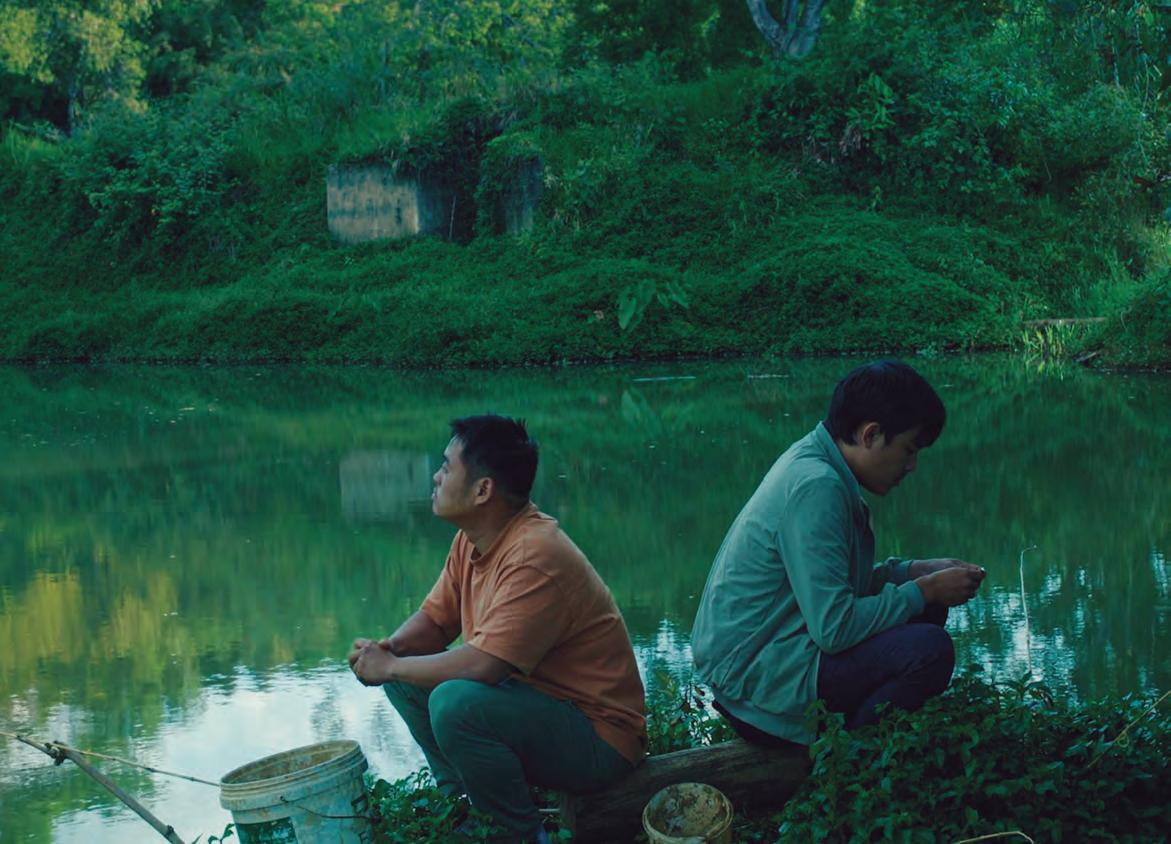
another meaning. Returning to Williams, when technologies of attention inhibit our capacity for reflection, we are doomed to be mere instruments of others. Because reflection is the way we “direct attention to our own mental activity, in order to question our beliefs and our motives”.
All this previously developed trend is having a significant impact on the construction of images. Because, what happens when what you intend to sell are, precisely, images? In 2022, The Gray Man (Anthony and Joe Russo) was released on Netflix, a $200 million blockbuster of which it was impossible to highlight a single shot.
There was a time when the film viewer confronted the television viewer, pointing out the shortcomings of the latter. In 2024 the battle adds cinema made in streamers, a method that aims to create images to be enjoyed on all kinds of devices. Flat images, designed to be consumed at 1.5x speed so they can be put together with the next one. Interchangeable images that fight to seduce viewer’s attention. Images that, together with the emergence of AI, draw an unknown panorama for the future. A panorama in which perhaps terms such
as editing or mise en scène will have to be rewritten.
“Never before there has been such a huge gap and lack of synchrony between the images from cinema filmmakers and the way new generations consume them”
In his book ‘The Shallows: What the Internet Is Doing to Our Brains’ writer Nicholas Carr tells how throughout history technological advances have been replacing capabilities developed by human beings. Carr details how the birth of books or maps implied losses in our memory and/or orientation capacity, at the same time that he warns of the shortcomings that digital environments can cause in our attention system.
Carr explains how our brain is an organ eager for stimuli, with a great capacity to encrypt its attention in multiple spaces, and that the digital world, with its continuous display of novelties, is a treat for this. And although we flee from apocalyptic prophecies, this is the world we are facing, with all the gains and losses that this implies.
In 2017, 78/52 (Alexandre O. Philippe) was released, a documentary focused on the detailed description and analysis of the shower murder sequence in Alfred Hitchcock’s masterpiece, Psycho (1960). Thus, what at first seemed to lean towards the sociocultural interpretation of Hitchcock’s work through multiple interviews, ends up with an in-depth exploration of all aspects - editing, choice of shots, use of sound, scenographic details of the forementioned sequence, with a fetishistic but also pedagogical intention.
In a universe collapsed by interchangeable images, 78/52 focuses on the analysis of 78 seconds and 52 shots. In a context where quantity seems to prevail, 78/52 calls for taking care of our gaze, pointing out that every image deserves meaning and care

JUAN ANTONIO BAYONA’S FEATURE FILM WINS THE PLATINO AWARD FOR BEST IBERO-AMERICAN FICTION FILM AND BECOMES THE PROTAGONIST OF THIS EDITION, WITH A TOTAL OF SIX AWARDS INCLUDING BEST DIRECTION, BEST MALE PERFORMANCE, BEST EDITING, BEST CINEMATOGRAPHY AND BEST SOUND.
The Platino Ibero-American Film and Audiovisual Awards are annual awards, created by EGEDA and FIPCA, with the support of the Film Academies and Institutes. Their aim is promoting Ibero-American culture and cinema and bringing the industry together.
Society of Snow emerged as the winner of the ceremony held in Xcaret (Mexico). Bayona’s film won a total of six Platino Awards at the 11th edition.
“It took us ten years to make this film because everyone said our budget was not possible in Spanish. Today, it has become the most viewed film in history in Spanish on Netflix and the third most viewed of the year”, said Juan Antonio Bayona when collecting the award that recognized his film as the Best Ibero-American Fiction Film.
“Sometimes you have to do things differently to change the rules of the game.
We have all the tools to do it and to attract the audience in order to go watch our films. In Ibero-America we have the talent to make it”, he stated.
The debut film by Estibaliz Urresola Solaguren, 20,000 species of bees , had an impressive night as well, achieving four awards: Best Debut Film, Best Screenplay, Best Supporting Female Perfomance and the Award for Cinema and Education.
Other awards for feature films were for Robot Dreams (Best Animated Film), The Eternal Memory (Best Documentary), Isabel Coixet’s Un amor (Best Female Performance for Laia Costa) and Víctor Erice’s Close Your Eyes (Best Supporting Male Actor for Jose Coronado).
In the television field, Barrabrava won the award for Best Miniseries or Teleseries.
This show, which can be watched in Amazon Prime Video, follows two brothers that are expelled of their beloved team’s gang. Alone, without money or political protection, they will start a war that will put their brotherhood to the test.
We want to hightlight that Movistar TV show The Messiah ,created by Javier Ambrossi and Javier Calvo, gathered two awards for the female perfomances: Lola Dueñas and Carmen Machi.
Daniel Burman was named Best Creator for the second season of Yosi, the regretful spy
One of the most touching moments of the ceremony happened with Platino Honorary Award, which was given to Argentine actress Cecilia Roth . The award was presented by Enrique Cerezo, president of the Platino Awards, who defined her as “an ambassador of Argentina and all of Latin America”.
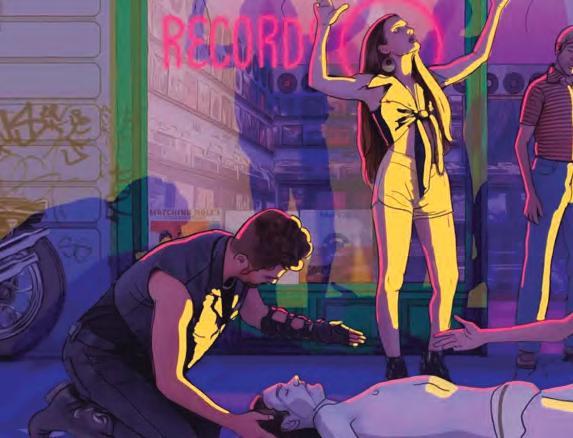
FROM 9TH TO 15TH JUNE, ANNECY FILM FESTIVAL, THE MOST IMPORTANT EVENT IN THE WORLD OF ANIMATION, TAKES PLACE, WITH ITS POPULAR MARKET (MIFA) BEING HELD FROM 11TH TO 14TH. AMONG THE FILMS THAT WILL COMPETE FOR THE CRISTAL AWARD FOR BEST FEATURE FILM IS THE SPANISH FEATURE FILM ROCK BOTTOM. SPAIN HAS ALSO A WIDE VARIETY OF TITLES THIS YEAR IN DIFFERENT SECTIONS.
Spain has already been quite successful in past editions of the festival. Last year, Robot Dreams dazzled the audience by winning the Best Film award in the Contrechamp section and the previous year Unicorn Wars competed in the main section, demonstrating once again the quality and relevance of the animation industry in Spain.
Rock Bottom leads the Spanish army this time. Directed by Maria Trenor, this 2D animated film is produced by Alba Sotorra SL, in co-production with GS Animation, Jaibo Films and Empatic.
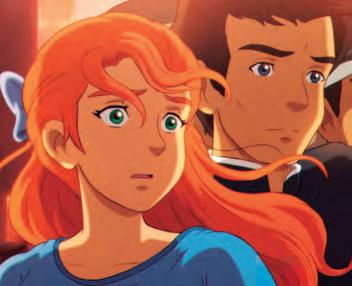
artists immersed in the creative whirlwind of the early 70s hippie culture. Drugs will turn a passionate summer into a nightmare in a journey through the themes of Wyatt’s music: the euphoria and anguish of artistic creation, the unconscious fascination with drugs, the disenchantment with routine and physical and mental degradation.
Another animated films in contention in the main section in Annecy 2024 are: Into the Wonderwoods, Flow, Ghost Cat Anzu, The Colors Within, The Most Precious of Cargoes, Totto-Chan: The Little Girl at the Window. Memoir of a Snail, Sauvages, A Boat in the
The Imaginary and The Storm

In the Contrechamp section there are three Spanish films. 2D animated feature Black Butterflies is directed by David Baute and produced by Ikiru Films, Tinglado Film, Anangu Grup, Televisió de Catalunya and Tunche Films,
The plot revolves around how climate change impacts the lives of Lobuin, Vanessa and Soma, three women from very different points of the planet but with something in

common: all three lose everything due to the effect of global warming and are forced to migrate to survive.
The Glassworker is a movie by pakistani Mano Animation Studios that it’s coproduced by Spanish Manuel Cristóbal and directed by Usman Riaz with an japanese anime flavour.
Storyline: Young Vincent and his father, Tomas, run the finest glass workshop in the country and find their lives upended by an impending war in which they want no part. The arrival in their town of an army colonel and his young, talented violinist daughter, Alliz, shakes their reality and tests the relationship between father and son.
The third film is Sultana’s Dream, directed by Isabel Herguera, a film that was premièred in San Sebastian Film Festival Competition. Synopsis: Taking her inspiration from a feminist sci-fi short story written in Bengal in 1905, Inés sets out on a voyage of discovery around India in search of Ladyland, the Utopian land of women.

Annecy Presents will show Buffalo Kids by Juan Jesús García Galocha and Pedro Solís (Mummies), and produced by 4 Cats Pictures, Atresmedia Cine y CORE Animated Effects. It´s a story inspired by the Pedro Solís story ‘Cuerdas’, with a script written by Jordi Gasull and Javier Barreira.
Set in 1886 America, two young Irish siblings Mary (9) and Tom (12), arrive on an ocean liner to the hustle and bustle of New York City. They made the long trip to meet their Uncle Niall and secure their inheritance.

CINEEUROPE 2024 WILL TAKE PLACE 17-20 JUNE AT THE CENTRE CONVENCIONS INTERNACIONAL BARCELONA (CCIB) IN BARCELONA, SPAIN. CINEEUROPE IS THE LONGEST-RUNNING AND MOST SUCCESSFUL EUROPEAN CONVENTION AND TRADE SHOW FOR MAJOR, REGIONAL, AND INDEPENDENT CINEMA PROFESSIONALS.
CineEurope is the Official Convention of the International Union of Cinemas (UNIC), which repre-sents the interests of cinema trade associations and cinema operators covering 39 countries in Europe and in neighbouring regions.
The convention is organized by The Film Expo Group, that also produces ShowEast, held in Miami; and CineAsia, held in Bangkok.
CineEurope feature every year exclusive screenings and product presentations of upcoming films, sponsored events, timely and informative seminars, and the CineEurope Trade Show.
Apollo Kino have been named as the 2024 recipient of the ‘International Exhibitor of the Year’ award at CineEurope. Accepting on behalf of Apollo Kino will be CEO Kadri Ärm. Apollo Kino operates 18 cinemas and 91 screens in Estonia, Latvia and Lithuania with almost 3.5 million visitors every year.
Picturehouse Cinemas’ Clare Binns will receive UNIC Achievement Award. Over 40 years, Clare Binns dedicated her career to the cinema industry. Now it´s Managing Director of Picturehouse Cinemas. She has successfully overseen its expansion and now the company is operating 28 innovative neighbourhood cinemas.
The recipient of the CineEurope Milestone Award, given in recognition of
its outstanding accomplishments within European cinema exhibition, will be Kinepolis Group, the Belgian company operating 109 cinemas and 1,131 screens worldwide.
We also know the winners of the CineEurope Gold Awards, given to cinema professionals for their outstanding dedication and service to the sector. The Awards will be presented as part of the CineEurope Awards Ceremony on Thursday 20 June.
This year, the recipients are Christin Berg, Nordisk Film Cinemas; Greg Hayko, Cineworld; Stephan Herzog, Pathé Suisse; Gianluca Pantano, UCI Italy, ODEON Cinemas Group; Grégoire Schnegg, blue Cinema; Andrea Stratta, Notorious Cinemas; Jurgita Vaišien, CINAMON Group; and Kinga Zaborowska, HELIOS.






